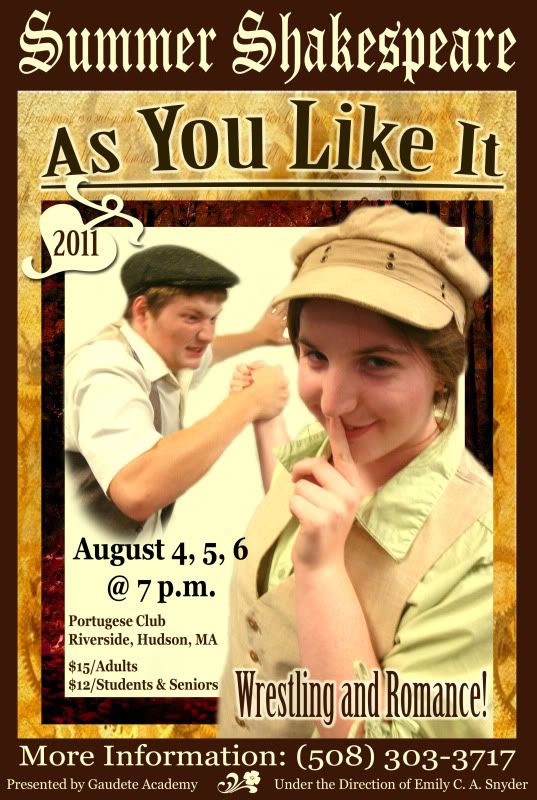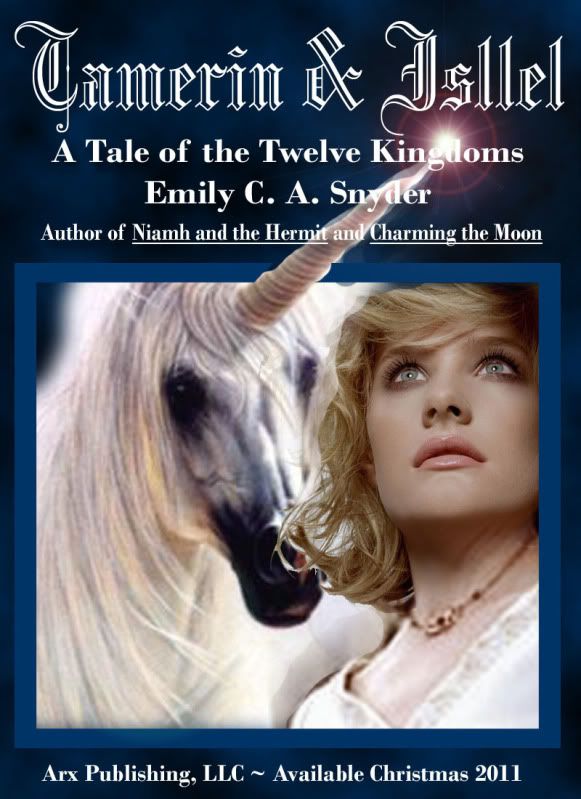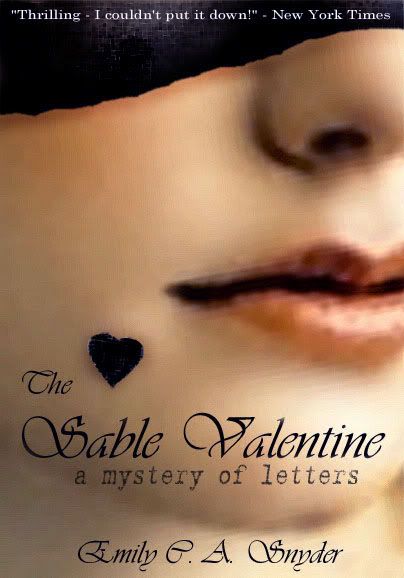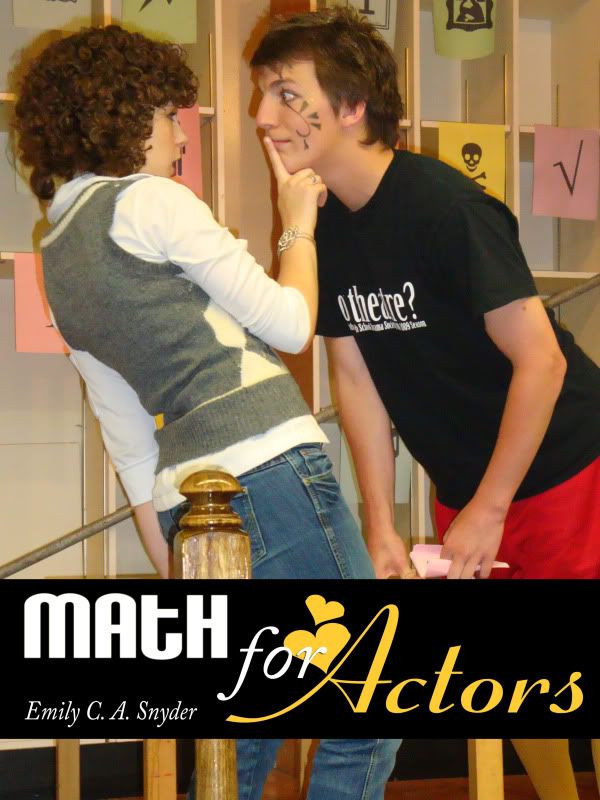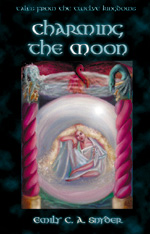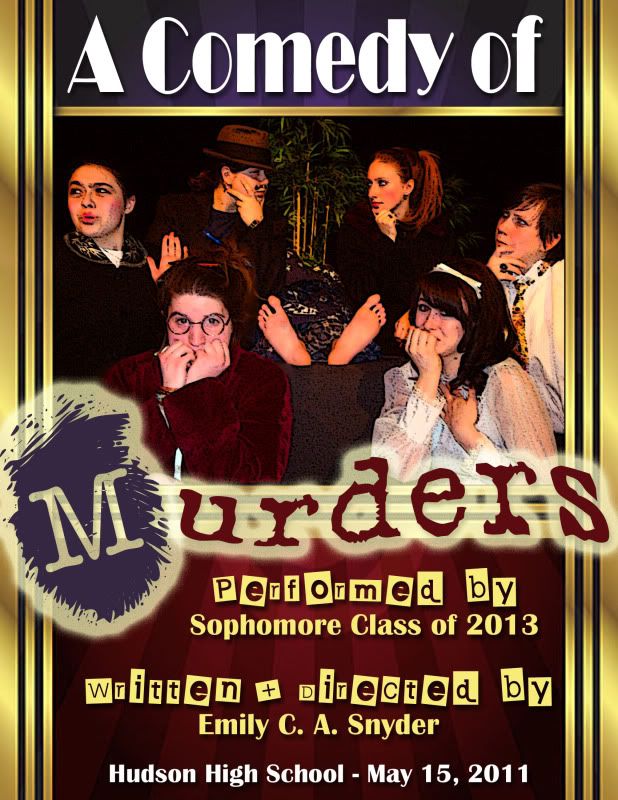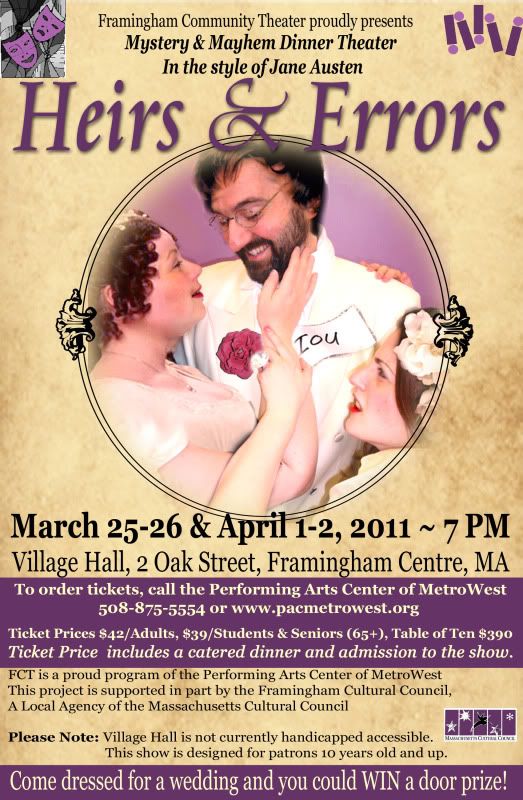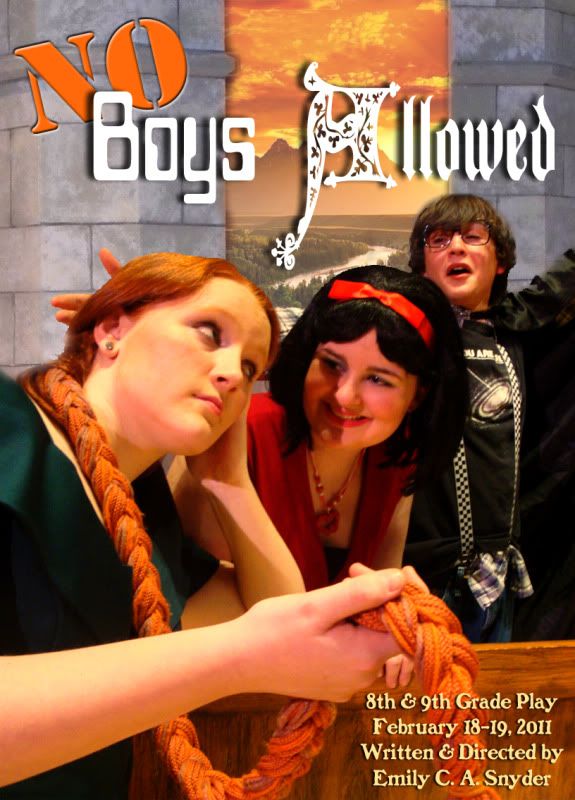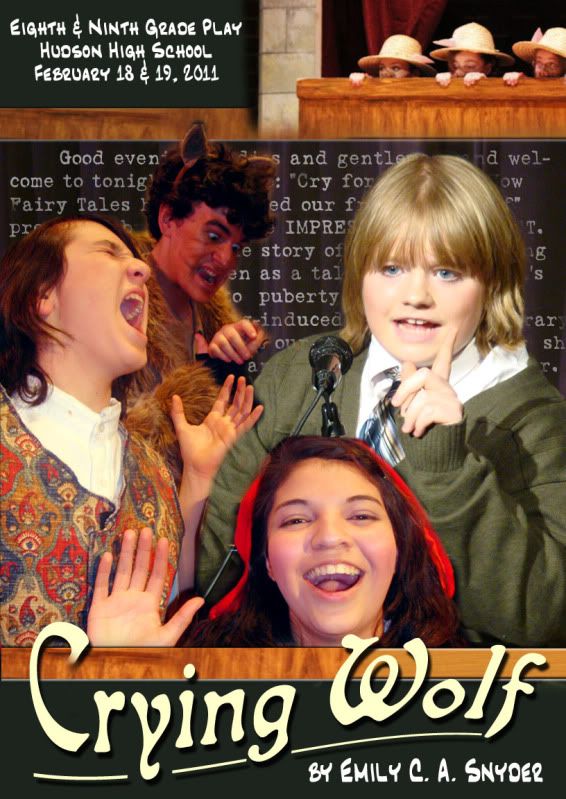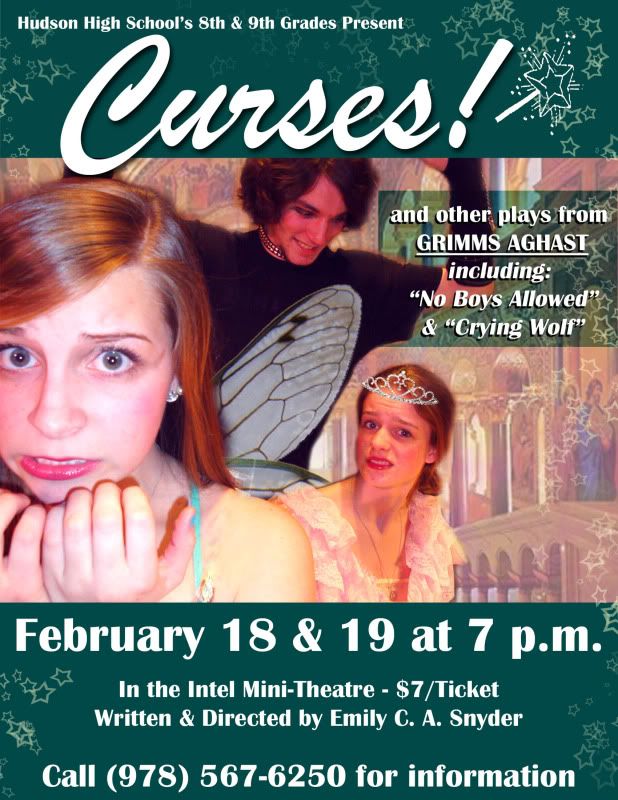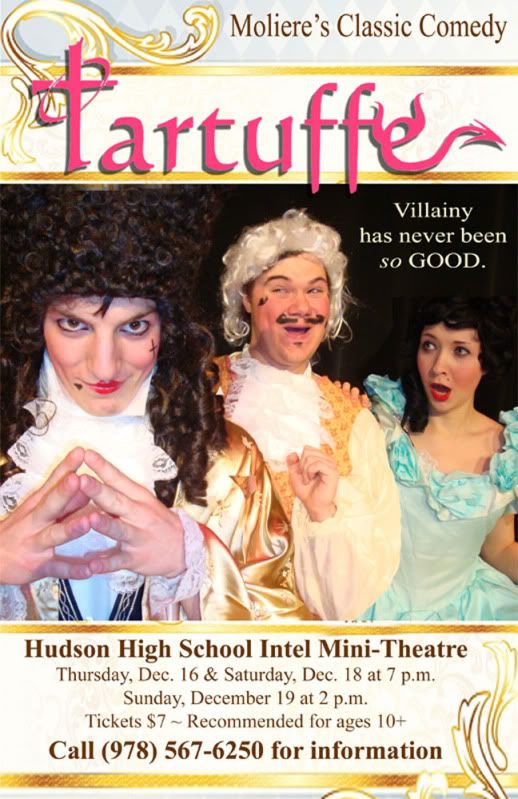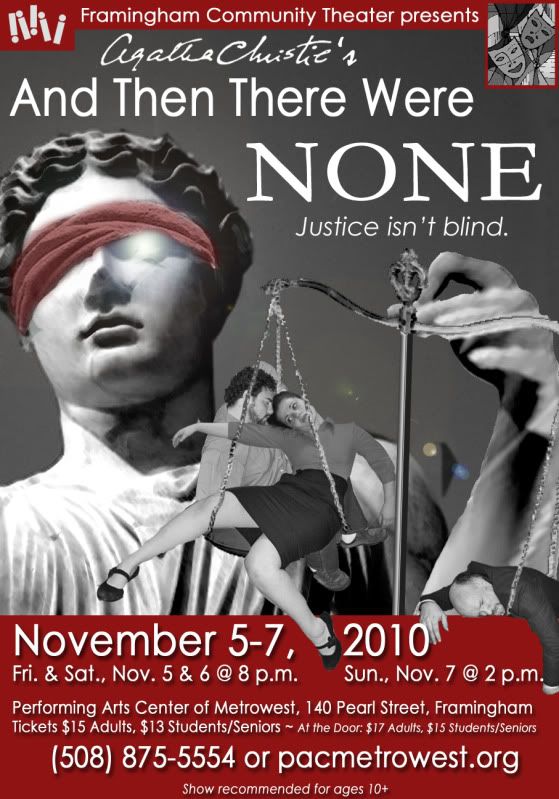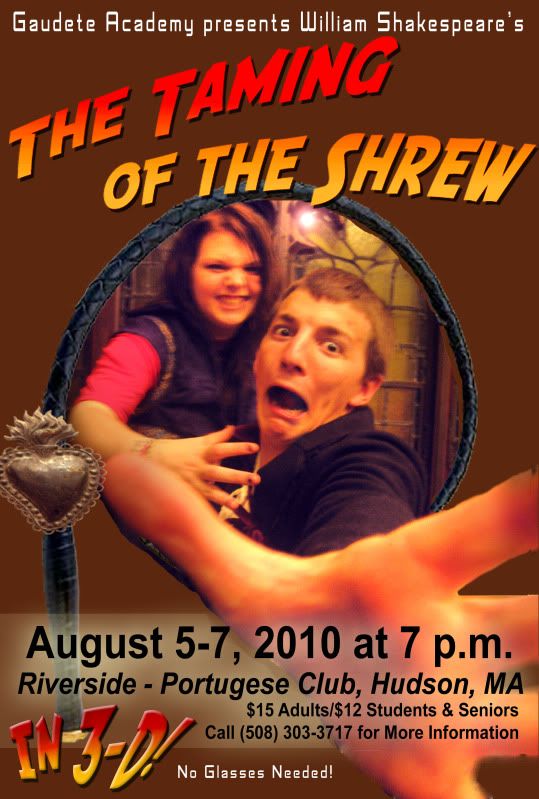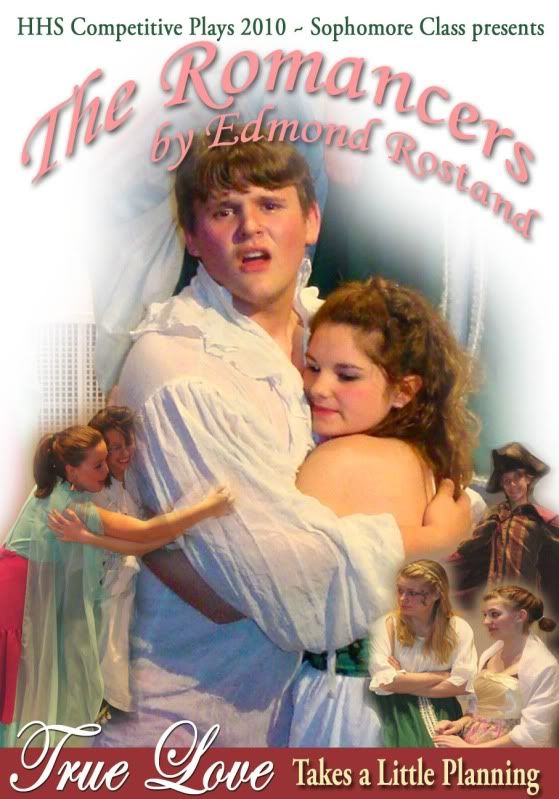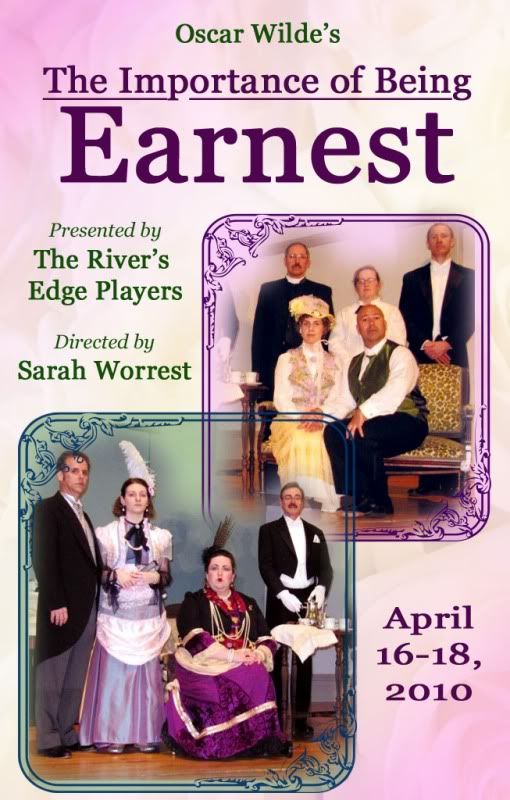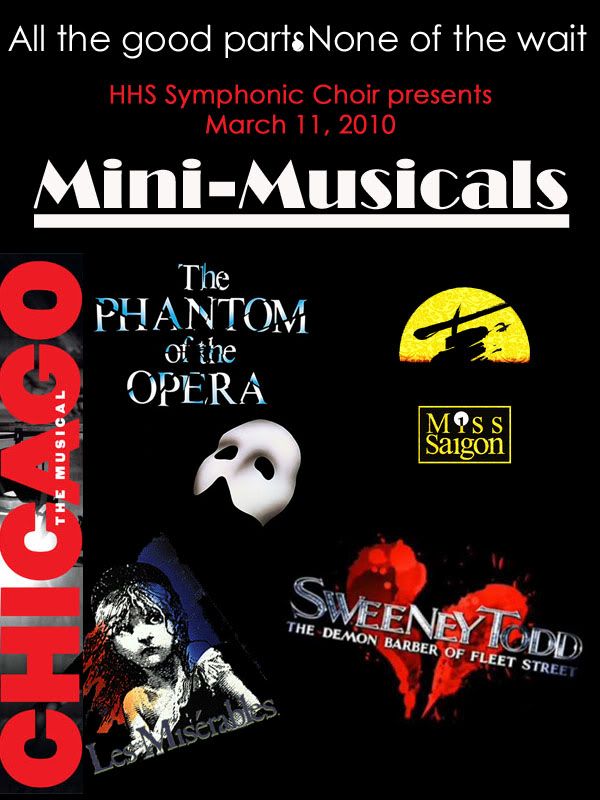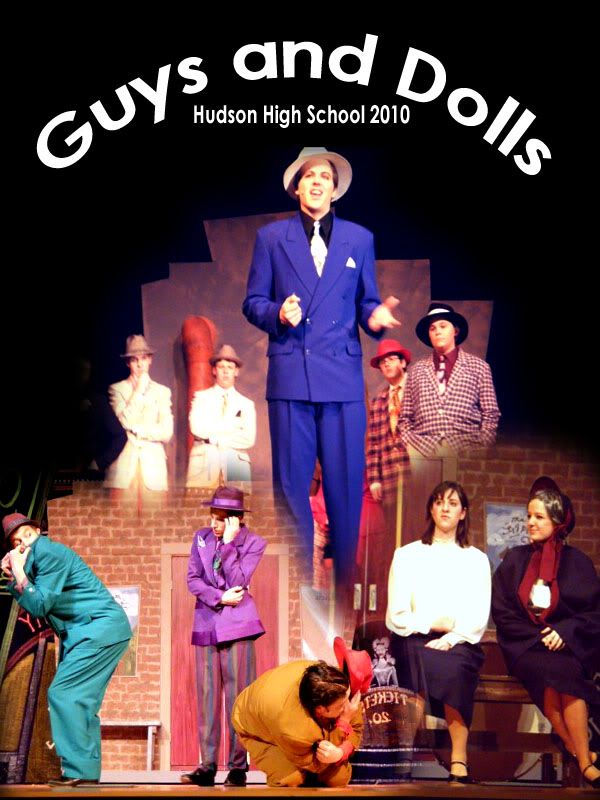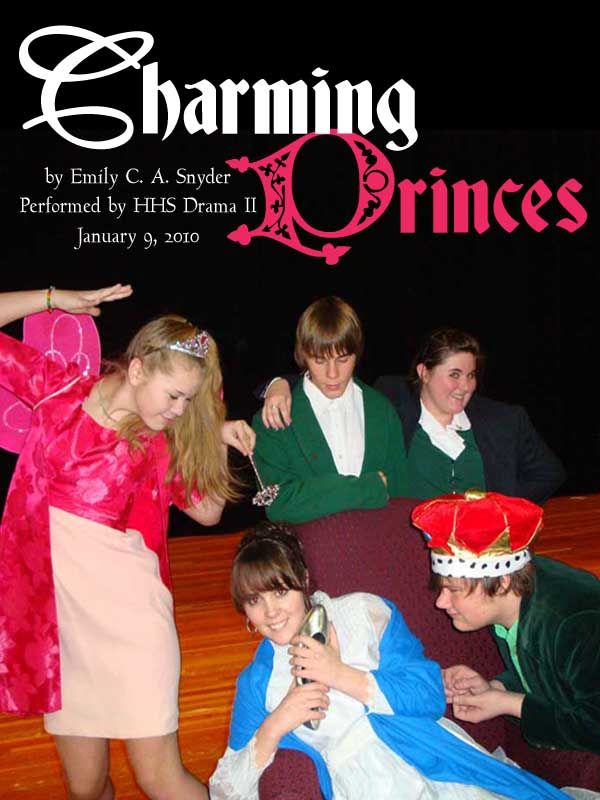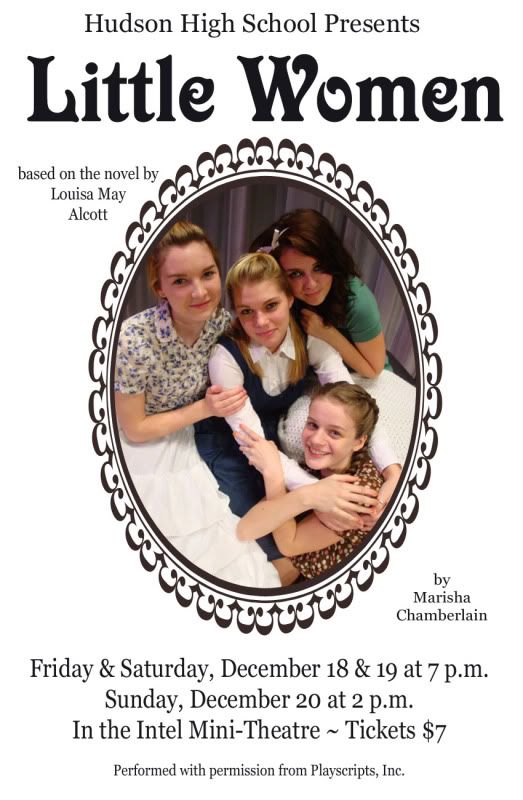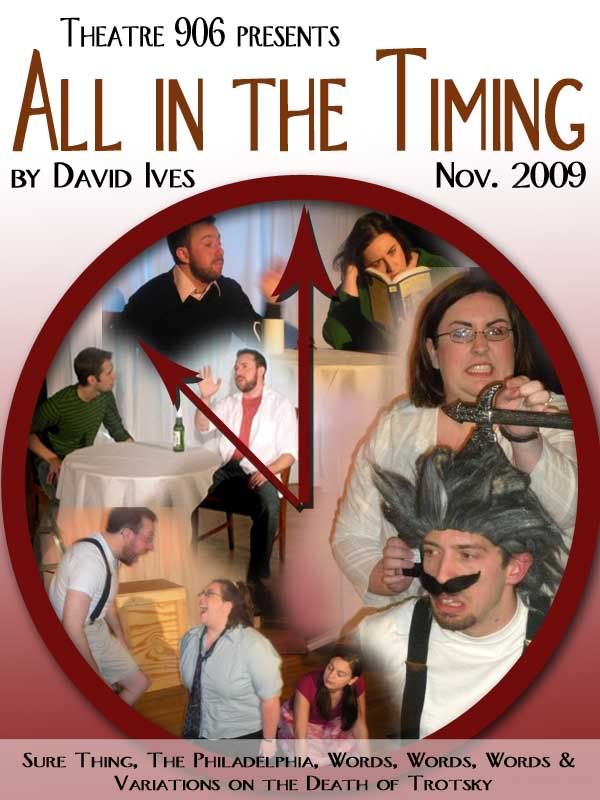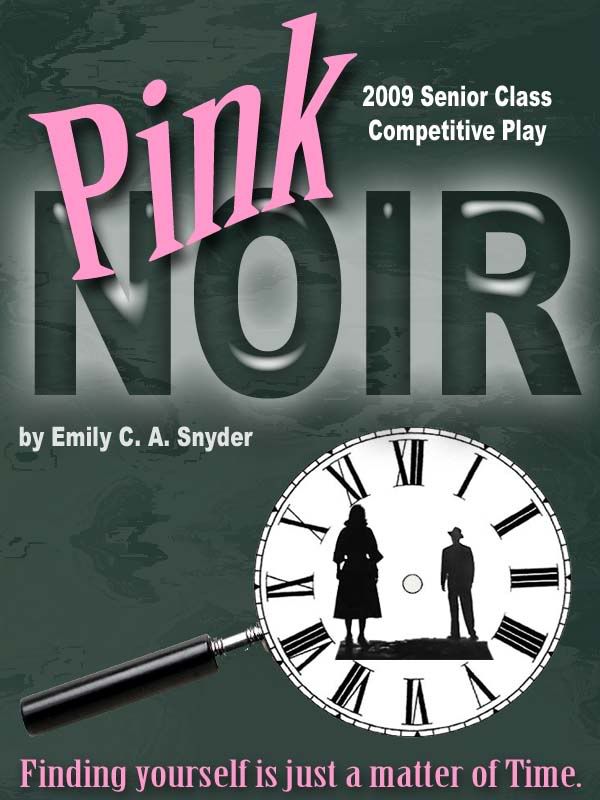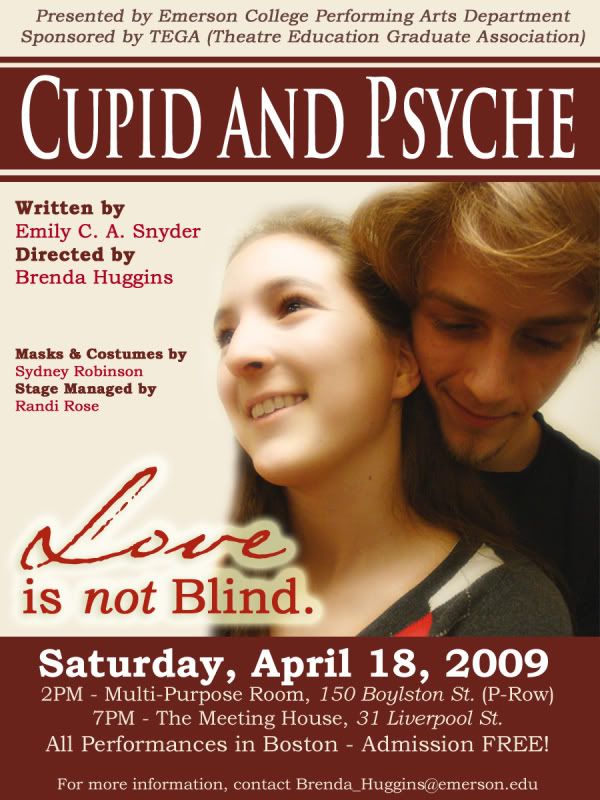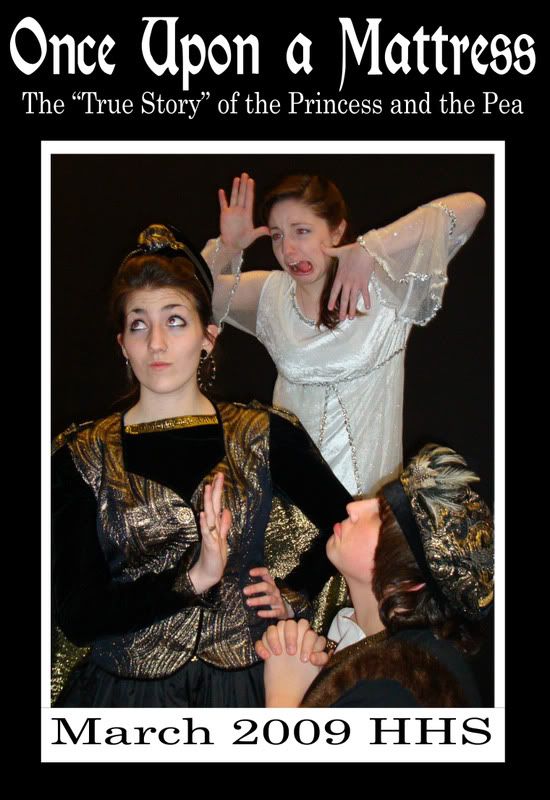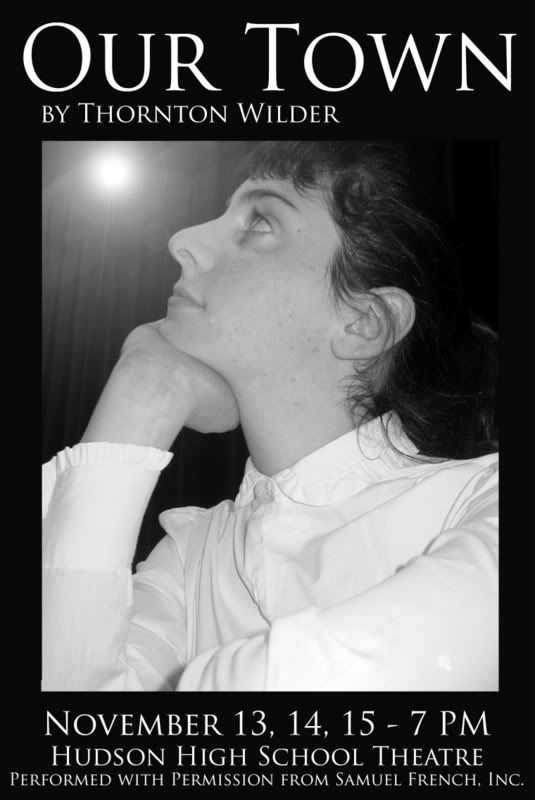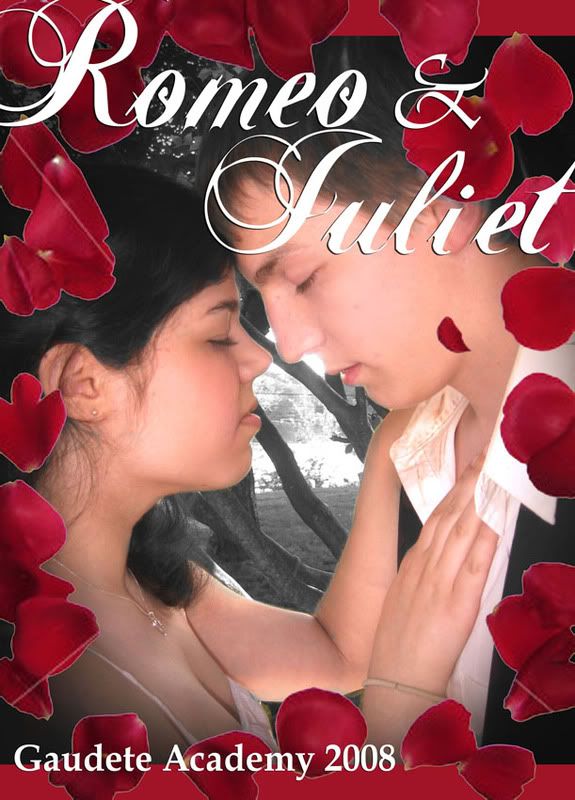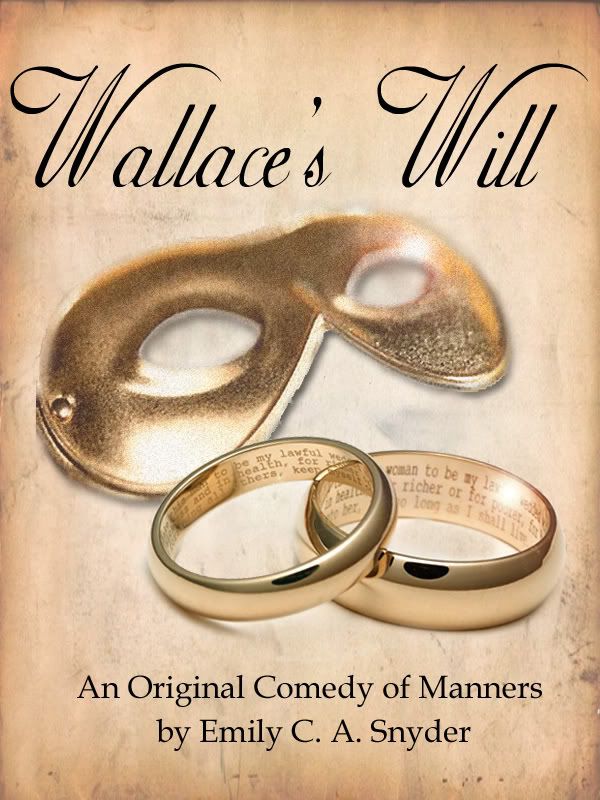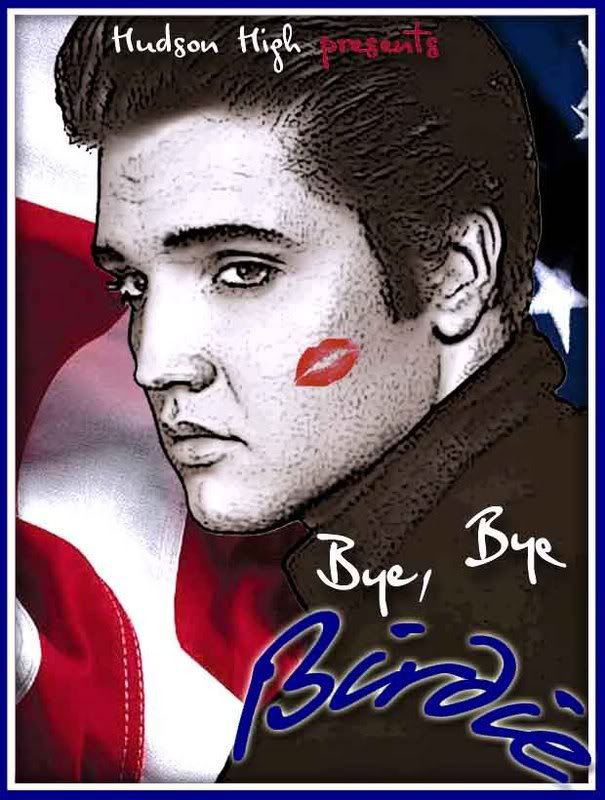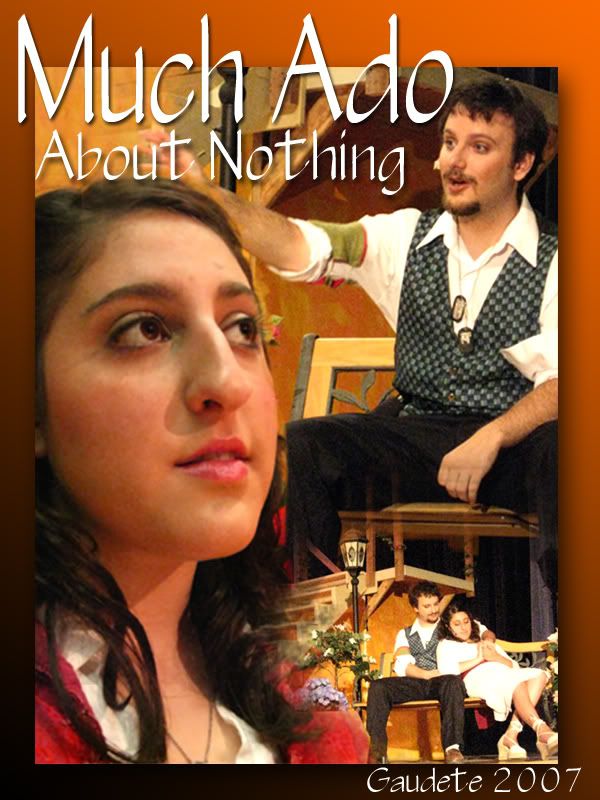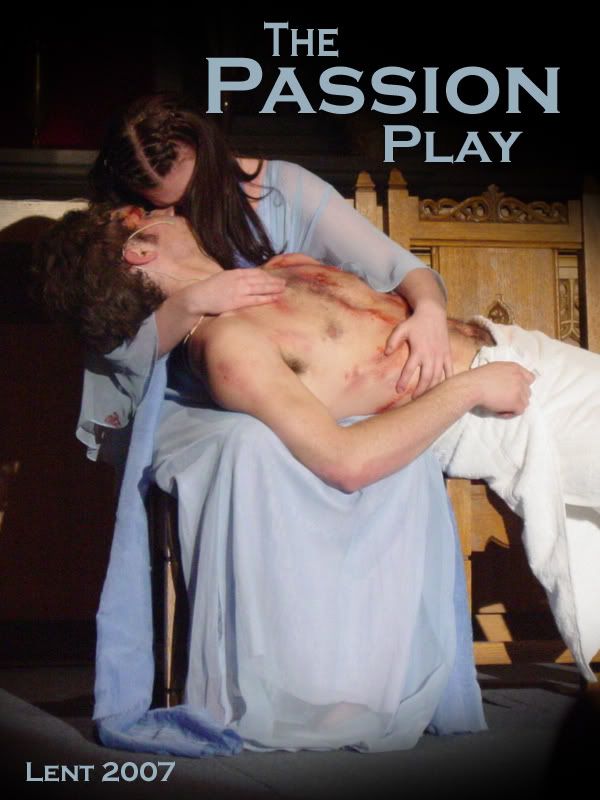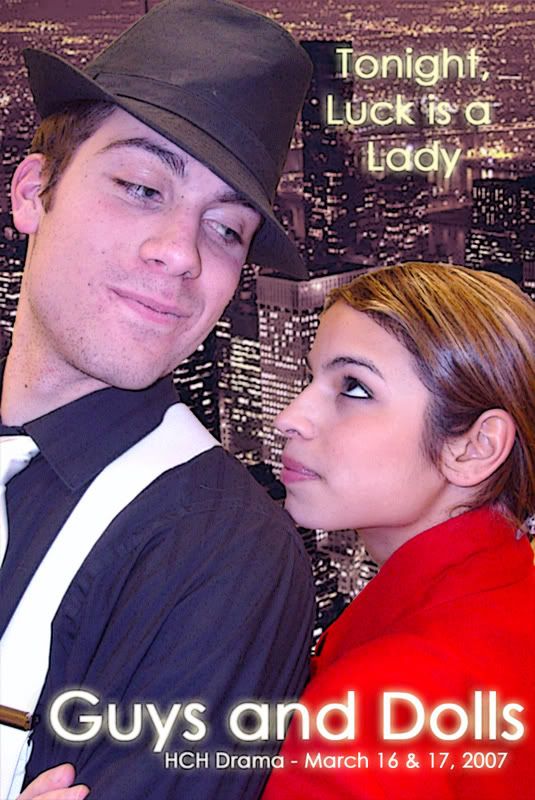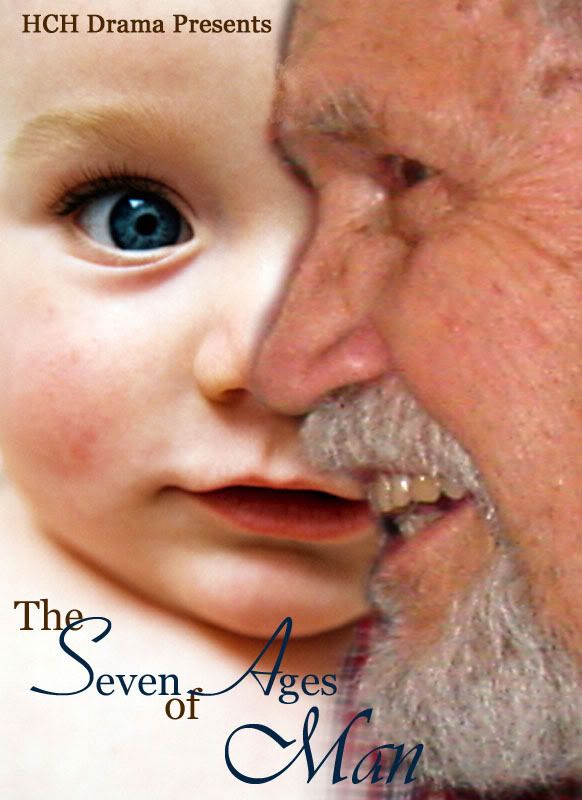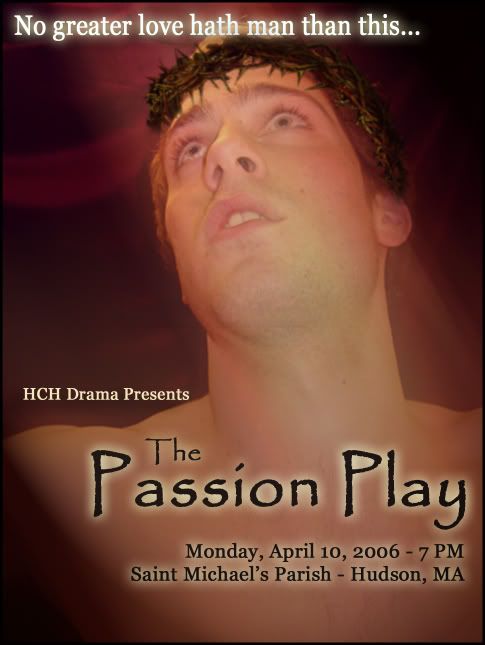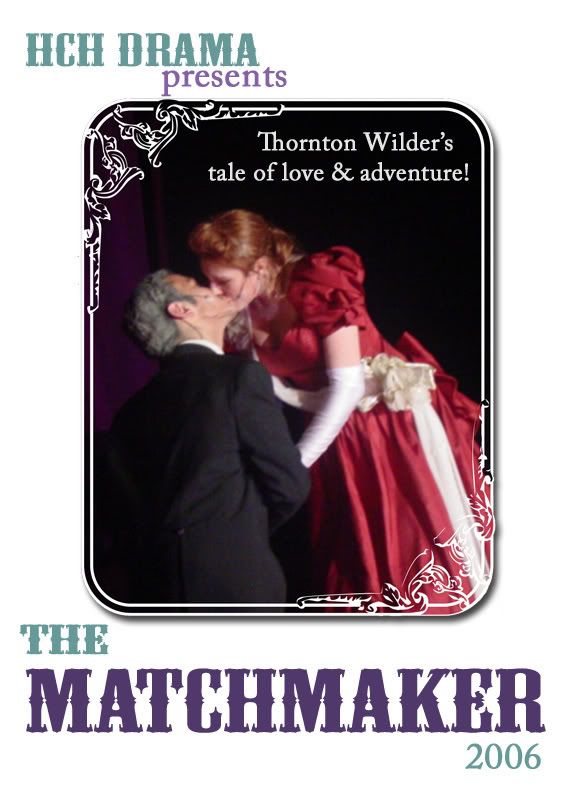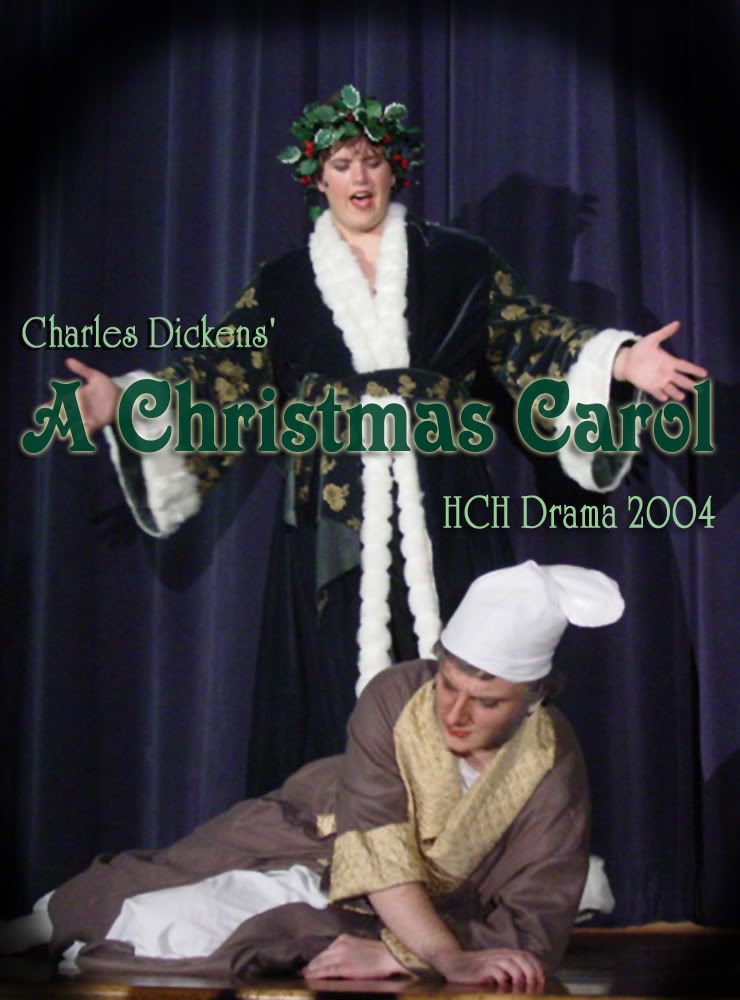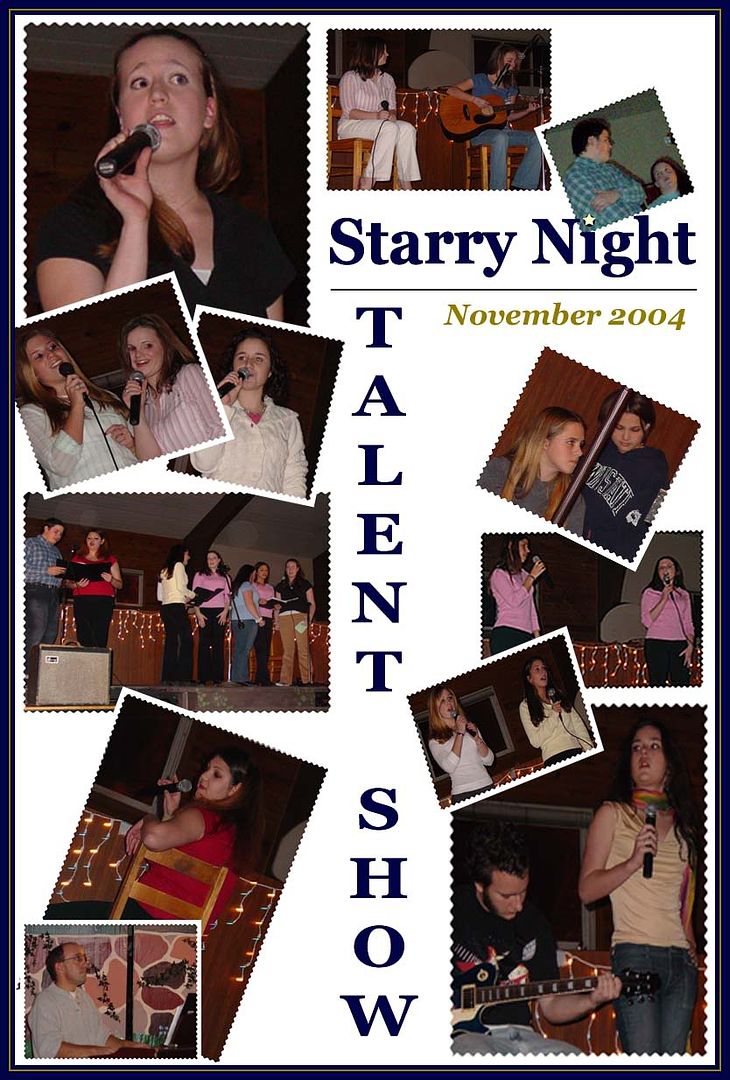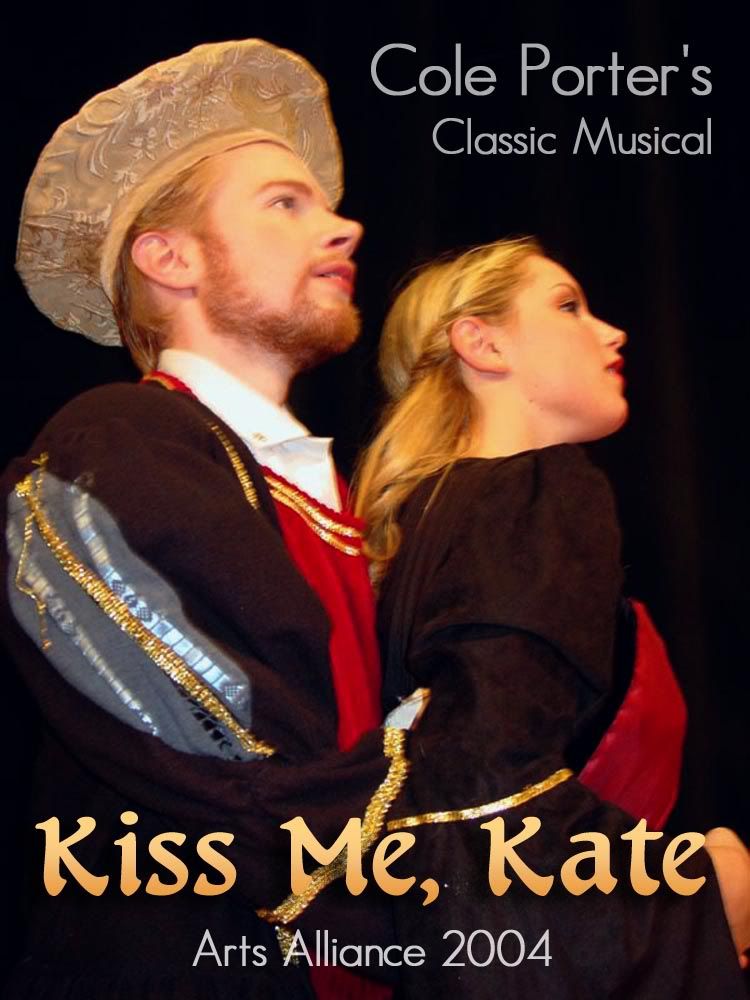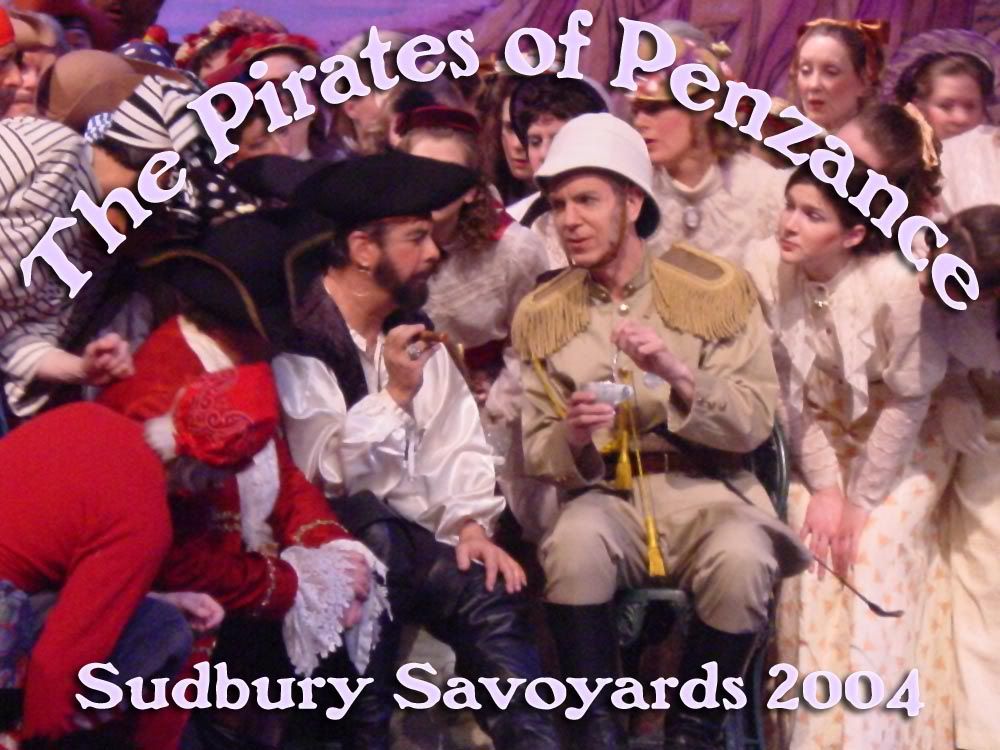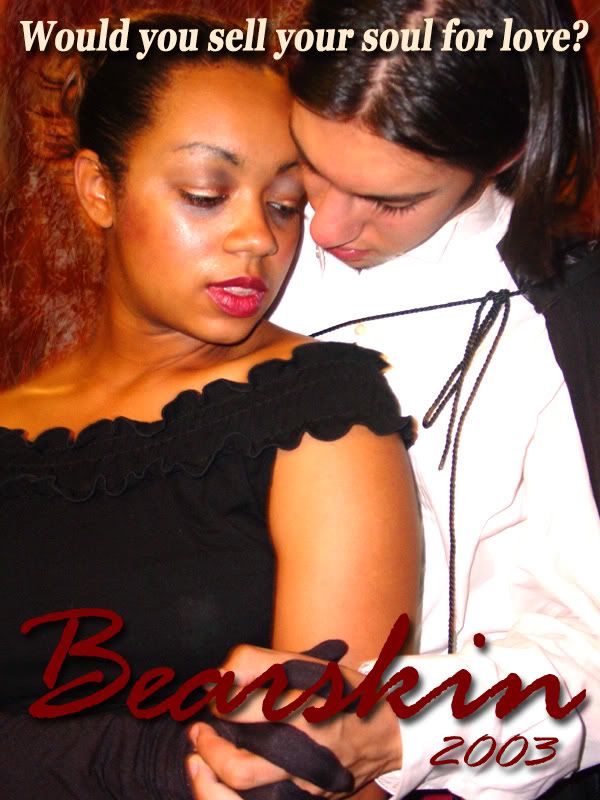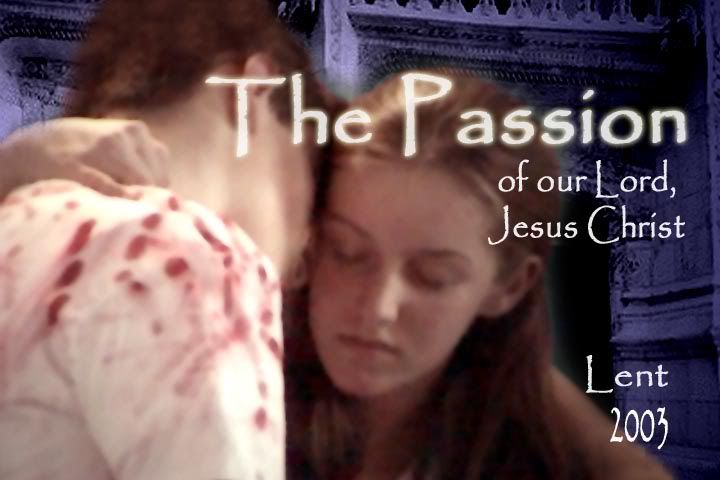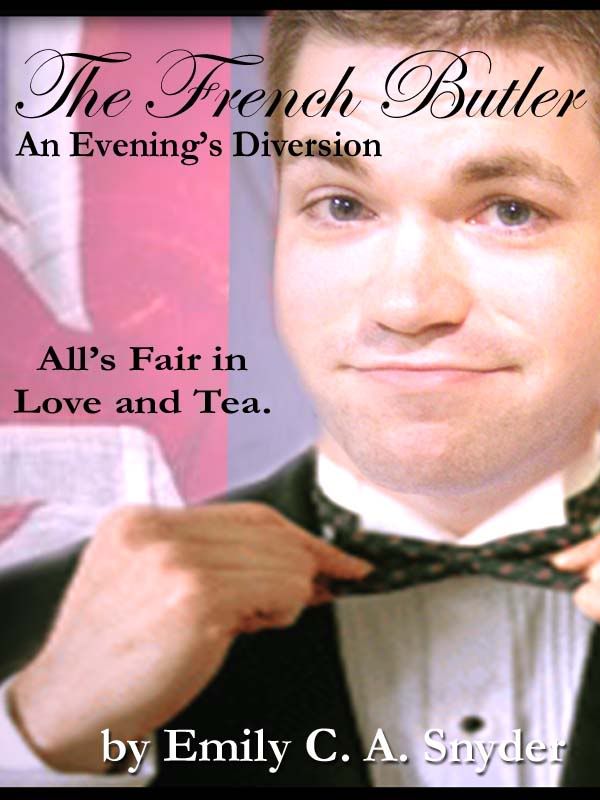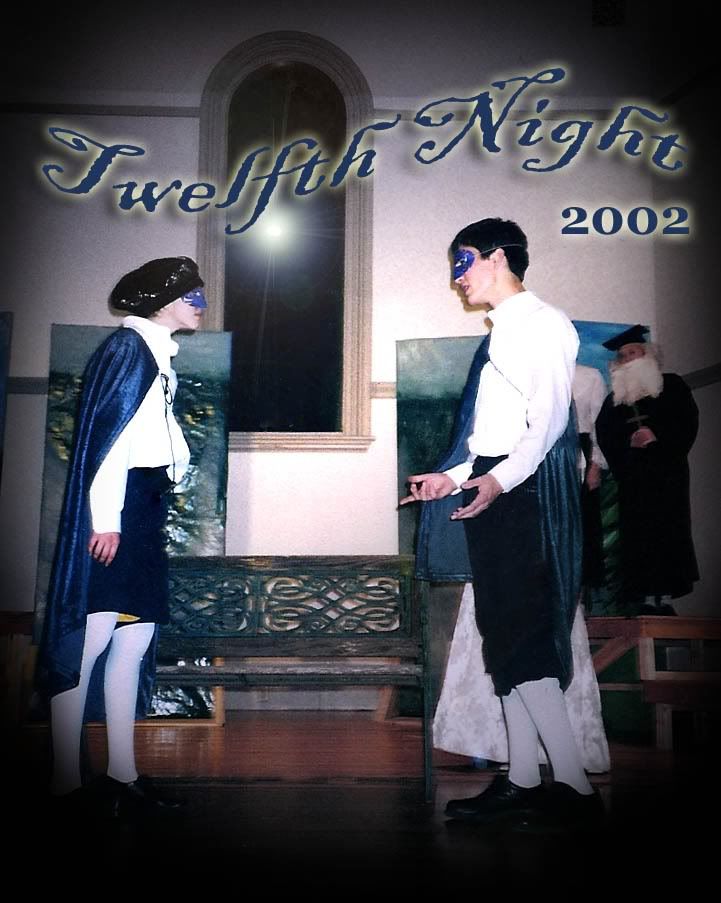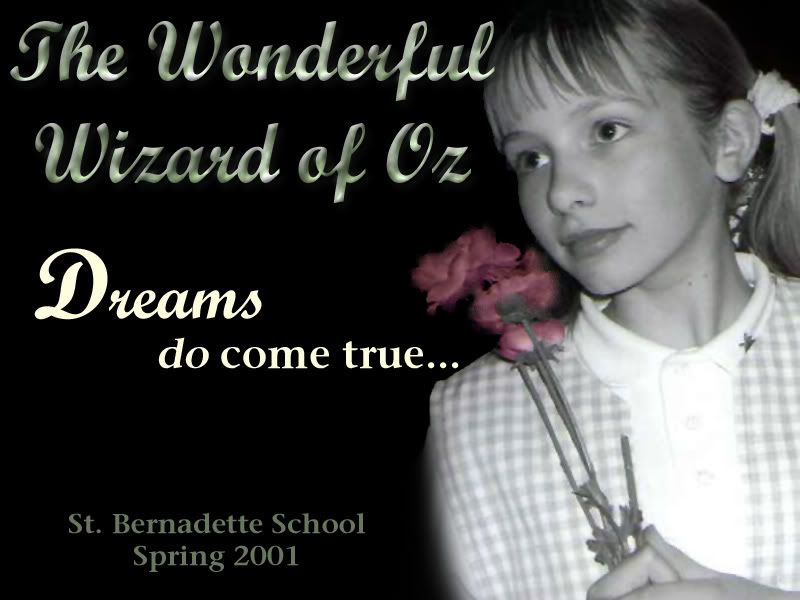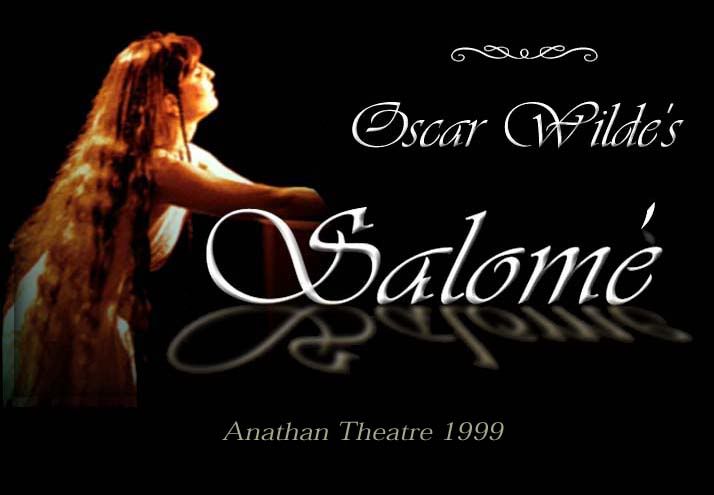 The sporadic ramblings of Emily C. A. Snyder - devoted to God, theatre, writing, and much randominity.
The sporadic ramblings of Emily C. A. Snyder - devoted to God, theatre, writing, and much randominity.
About Me

- Name: Emily C. A. Snyder
- Location: New York, New York, United States
Host: "Hamlet to Hamilton: Exploring Verse Drama" | Founder: TURN TO FLESH PRODUCTIONS | Author: "Cupid and Psyche" "Nachtsturm Castle" & Others | Caitlin O'Sullivan in "The Ghost Ship" (Boston Metaphysical Society)
Friday, November 25, 2005
La Belle Dame Sans Merci
The bestest of all of them, the one with La Belle Dame on the black charger and the gorgeous knights sans helmet beside her is this month's picture on my Pre-Raphaelite calendar. Happy day!
That has nothing to do with anything. And isn't that nice - to have things in life that exist merely for the beauty of their own existance? Very Coleridge of me, I know. But then I've always been more of a Romantic than anything else.
So, in a much shorter weekend update than below:
Must needs write another long post re: How To Film a Movie Musical. Coming at some point to a blog near you!
Had two glorious days off (well, mostly off) and then woke up this morning and was put right back into work by maternal unit a.k.a. my producer a.k.a. Mom. (LOL - just realized, she's my producer in more than one fashion! Oy.) And in a moment I'll go back to the grindstone to get stuff together for, what else?, Nutcracker.
Two weeks to show. AAAAAAAAAAAAAAAAAAAAAAAUGH! But I'm not panicked. Just don't sneak up on me and we'll all stay alive.
Perhaps the Hindenburg was just under a lot of emotional stress?
What better family is there than mine? We had a very progressive dinner, intersperced with reading poetry to one another. Peter even read Browning's whole "Pied Piper" and did very well. He also read two original pieces which are really pretty good. We're deferring the "sit-on-your-butt-a-thon" (name courtesy of Daddy, who else?) until Christmas-y when we'll pull out LOTR, Star Wars, Indiana Jones, etc. and just keep them going. But I admit it was a little odd not to watch Galaxy Quest on Thanksgiving. ;P My family? Into the arts? Nah. Those walls covered in Julie's various portraits - nothing. That attic stuffed with costumes and backdrops from my other productions? Nada. Johnny and Peter's instruments and music lying around? Psht. Dad's laptop with novel going? Ha! And then Mom's boxes and boxes of photographs? Meine worde! I do love them all. Although I confess that I was running down to my laptop every now and again to type out a bit more of...
The Sable Valentine! Yes yes yes, precious! I've written about 6K words in letters between Giselle and her dad. Jules had me read outloud to her what I had thus far - both the new and what I've printed out a while ago - while she made the cucumber boats stuffed with chicken salad. Living with Julie, Mom, Dad and Johnny who are all chef dabblers? Happiness, Miss Piggy! And I'm very glad to wash and dry - it means I get to belt out songs to my heart's content. How can you tell Emily's in a good mood? She turns into the Singing Bush. Anywho, in writing TSV, I got to do another "bad proposal" scene (like the one from Not All Wealth only infinitely more horrible!) which is always so much fun. Poor Gizi! Poor Maundy (nee Mundanity) Smith! But it's a delight to write what I always think of as Austenesque. And what a greater delight to look forward to seeing P&P3 again with Jules this Sunday! Happy day!
Purchased Christmas Cookie Yankee Candle today. Oh happy day. Oh happy olfactory. (Really, scientists oughtn't be allowed to name things. Olfactory? I mean, c'mon!)
One more Rent quibble - or hilarity: at the end (or near end) Roger is singing out "Mimi! Mimi!" over her (supposed) corpse - but he's doing so to an overdriven guitar whamming out "Musetta's Waltz!" Aaaaaugh! Oh, come on! If you're going to call out "Mimi!" don't do it to another person's theme music! Hallo! Leitmotif 101! Right, enough of that.
When Jules and I went to see Sideways Stories at Emerson, she took this amazing photo of me. You'll notice Jack's Joke Shop where I purchased Drosselmeier's thumbs. And speaking of which, take a look at these publicity shots.
Happy Thanksgiving to one and all! Mmmmwah! God bless you!
Mood: Joyeux, merci
Music: The Producers - something upbeat, irreverent, and meant to fall apart at the seams.
Thought: Thank God for everyone behind the scenes. Amen!
The bestest of all of them, the one with La Belle Dame on the black charger and the gorgeous knights sans helmet beside her is this month's picture on my Pre-Raphaelite calendar. Happy day!
That has nothing to do with anything. And isn't that nice - to have things in life that exist merely for the beauty of their own existance? Very Coleridge of me, I know. But then I've always been more of a Romantic than anything else.
So, in a much shorter weekend update than below:
Mood: Joyeux, merci
Music: The Producers - something upbeat, irreverent, and meant to fall apart at the seams.
Thought: Thank God for everyone behind the scenes. Amen!
Wednesday, November 23, 2005
Obligatory Thoughts
On Rent.
Disclaimer: The following constitute my own opinions and thoughts. They're not meant to be incinerate as much as analytical. I'm also going to be very.very.long. Deal. My blog. My vacation. Bwahahhahhahah.
Oh, and presume the whole post to be one big spoiler. You have hereby been warned.
La Boheme Lingers
I'll admit up front that the primary reason I had no interest in Rent when it first came out was because I heard it was a rock opera version of my beloved La Boheme.
Now, you must understand that I was not yet a year out of high school when Rent hit it big, and thus not very long out of opera lessons. My high school voice teacher had been good enough to start me almost immediately on opera, rather than on musical theatre, and had by my senior year begun to give me operas with their librettos to listen to, as well as various opera magazines, biographies, etc. All this was joined with seeing five operas with my dear friend, Kristen and her father at the New York City Opera that year, as well as seeing Baz Lehrman's (although I didn't know it was he) version of La Boheme on the television soon after.
Somewhere in the midst of all this, my voice teacher lent me the record (yes the record) with the libretto of La Boheme. I went home, put on the record, opened the libretto and fell in love. Puccini's music soars - not only Musetta's waltz, but every aria, and recitative - I still thrill to this one minor phrase in Act III that Rudolopho sings when he's making up reasons why he's angry with Mimi - and the hymn to the overcoat still gets me here - and I'll admit that I openly weep when Rudolpho sings, "Mimi! Mimi!" over the orchestra's ending chords.
I heard it first, and so fell in the love with the music. Then I saw Baz Lehrman's version on TV and - despite the fact that everything was neon and his signature Coke "L'amour" was everywhere and the production I was watching was obviously dubbed - I wept and wept and wept. (Oh, Baz, you spastic oddball quasi-genius. I salute your risktaking.)
Later, infamously, I cajoled two of my household sisters to go with me to the Pittsburgh Opera's La Boheme, telling them that it was my favorite opera, that they'd love it, etc. - and have yet to live down my embarrassment of taking them to this particular production because it was so poorly cast and directed that even Puccini's music - as soaring as always - was drowned out by the bad visuals. (Examples: Rudolopho was a teeny grey aging man clothed in grey who looked like he might be dying of consumption, while Mimi was a dark-skinned, tall Amazon of a woman who would never succumb to consumption even if she was locked up in quarantine with TB patients. And the director decided that Act III was best played with NO ONE MOVING. And the only way he knew how to show love was to have the woman put her head on the man's shoulder, which resulted in a foot-wide gape between Rudolpho's shoulder and Mimi's head.)
But, even so. Puccini's La Boheme - le sigh.
Why, would I ever want Puccini's work to be transmographied into Jesus Christ, Superstar? I mean, even Andrew Lloyd Webber had converted to Puccini-lite, dangnabbit! I simply didn't see the point of ruining Puccini's masterpiece.
So, having now seen and heard Rent - how does it hold up?
Story: La Boheme
Focus: Rudolopho and Mimi are, of course, the center of Puccini's work - not so Larson's. Here time is divided (at least insofar as the movie showed) fairly equally between all couplings, with bonus points going to the same-sex couples over the single heterosexual couple. In point of fact, whereas Puccini triumphed romantic love over all else, Rent triumphs created family over all else. More about the philosophy later.
Characters: Rudolpho the poet is now Roger the musician; Mimi who does not begin as a courtesan (!!! - grrrr!) is our modern equivalent of a courtesan: an exotic dancer. Marcello the painter is now Mark the videographer (with a ghost assistant, apparently, who turns his old video camera's handle by magic) and his flirtsome Musetta is Maureen the bisexual performance artist. Musetta's latest lover (who she leaves in Act II, folks, with the famous "Quando m'en vo" - aaaaaaaaaaargh) is Joanne, a lawyer rather than a random rich man. (Gone, too, is the "ma pied" moment - ca ca ca. Instead we have a "moo" moment that makes no sense. More on this in a moment.) The landlord who frequently also plays the random rich man for Musetta in Act II is here given a larger role of Benny, an ex-roommate of Roger and Mark's, who has given up La Vie Boheme for, frankly La Vie. Rudolpho and Marcello's two good friends, who were a philosopher and a musician, are now lovers - a frequently fired professor and a transvestite street-performer.
The original story goes something like this: Act I Rudolpho and Marcello live La Vie Gaye, doing the best they can to sell their works and make enough to not completely starve. (They appear to have enough to somehow make it to the cafe in Act II, anyway.) They poke fun at their idiot of a landlord who stumbles in - rent and money-making are never really an issue; both roommates aren't against earning a living at what they do - they just don't have many customers - and then everyone wanders off to leave Rudolpho alone long enough for Mimi to enter the scene. Mimi is a sweet, naive young girl who makes and sells paper flowers for a living. In true operatic form, Rudolpho and Mimi introduce themselves in much-requested arias, and exit the scene in rapturous love (Mimi hitting a ridiculously high love piano...amazing).
Act II is later that same night at a cafe. The scene really only exists for two reasons: to introduce Mimi to the Bohemian gang (Mimi isn't really a Bohemian as much as a young girl struggling to make a living) where she's promptly welcomed, and to introduce us to Musetta, Marcello's on-again-off-again girlfriend. A moment, please, to honor one of the best opera couples ever.
A digression about: Marcello and Musetta - even in a horrible version of La Boheme - are still wonderful characters. They're like the Thenardiers in Les Miserables or Carlotta and the Opera Managers in Phantom of the Opera. Although they're not the original, they are the archetypical version of every secondary "Always True to You in My Fashion" leads, they're the folks who aren't doing what's right - like the virtuous leads - they're the ones who know how to have fun. And we love them for it.
But what makes Marcello and Musetta different is that they truly do care for one another - but in Scarlett/Rhett fashion, have difficulty showing it. In particular, Musetta does love flirting - and more than that if available - but always when she flirts, it's with one eye on Marcello to make sure he's watching, to make sure he's jealous, to make sure, in short, that he still cares. It's a stupid, insecure way of securing reassuring affection, but it's a habit Musetta doesn't seem to know how to kick. Marcello for his part is furious at her flirting and will break out in public brawls with her - as much to show any passing potential suitors that she is his as to get any time alone with her at all - but again, there's a deep-seated understanding of each other that obviously exists. One of the most lovely expressions of this is in the final verse of "Quando m'en vo" (a.k.a. Musetta's waltz), when she sings as an aside about Marcello, "And you who know/With your memory you struggle/You try to refuse me/But turn once more and look at me/And know that without you I will die." Breaks the heart.
At the very end, it's Marcello and Musetta who bring a dying Mimi to Rudolpho - and in her death, they at last come to an adult understanding with one another. Usually the secondary "Always True to You in My Fashion" couple end up together, but with the understanding that their union will be fraught with betrayal, anger, remonstrations and tears - in short, they are the warning couple, the Peter Pan couple, the couple that won't grow up. But in La Boheme this couple is given the adult dimension - there's the promise that Musetta will give up her flirting ways now, that she sees the value of the love of a good man, and that Marcello will take her even knowing all the pain she has caused him.
On to Act III of La Boheme - easily the most painful act. It's entirely exposition. I know that opera aficionados go on in positive raptures about this act because finally the action stops and the singing is given center stage - but opera aficionados, go take a crash course in basic Aristotlian dramatics, will you? You can have great singing and great action - really! Anywho, essentially several months have past, Musetta and Marcello are on the outs again after making up in Act II, and Rudolpho has been giving Mimi the cold shoulder because he's found out that she has TB and is going to die soon - so he figures if she leaves his life willingly he'll be able to bear it. Marcello scoffs at Rudolpho's cowardly selfishness (once he finally drags the truth out of Rudolpho) and tells him to get over himself and talk to Mimi. Just one problem - Mimi (who is one of our classic naifs and presumably didn't think anything of her blood-drenched coughs - d'oh) has overheard Rudolpho pronounce that she has consumption and is now all distraught. She tries to flee just as Rudolpho discovers her, but Rudolpho apologizes for being such a jerk and they promise to stay together at least 'til the spring (since neither knows how long Mimi will live). Frankly, it's a pretty stupid promise - if you're going to love someone, stick by them - don't let it be seasonal. (Oh, by George, it's March! We must be in love, Bertie! What ho?) But anywho, makes for a good duet. So long as no one's trying to put their head on anyone's shoulder. So much for Act III.
Act IV opens with Marcello and Rudolpho back at the grindstone attempting to get cracking on those poems and paintings again but really letting their thoughts stray to their respective girls. (Winter gave spring, summer and autumn the skip and went straight to winter again.) Just then, the other guys in the gang come in to cheer them up, everyone does a silly fandango when Musetta appears - she's got Mimi with her - Mimi is dying. Apparently after they broke up in the summer, Mimi realized that the paper roses business wasn't it was all cracked up to be, and saw that Musetta was always in the money with her various rich guys and so decided to try the courtesan routine. But as her consumption worsened the rich guys dumped her. Fortunatley, Musetta found her and brought her straight way to Rudolpho's. The gang jumps into action - Musetta goes out to use all of her money to buy medicines and get a doctor. Even the philosopher goes out to sell his coat in the middle of winter to help cover expenses. Marcello goes with Musetta - the two having reconciled - to leave Rudolpho and Mimi alone.
Together, they sing a duet that touches on all the various themes Puccini's created for them over the course of the play, and then Rudolpho promises that he'll never be cowardly again and they'll live together until death do us part. Mimi promised to rest and Rudolpho goes to open up the windows to let in light and with it life. Musetta comes in with the medicines, and everyone comes in after her. They see Mimi in the chair, having fallen asleep. Tentatively, they go up to Mimi - and discover she has passed away. Rudolpho finishes with the curtains and turns around to discover everyone staring at him. He speaks the only dialogue in the play: "What is it? Why are you all staring? What has happened? TELL ME!" And then everyone steps back from Mimi. Rudolpho rushes forward to her, catches her in his arms as she falls lifeless into him, and with a sob he cries out her name as the curtain closes.
Oh. Man.
Yeah, OK, simple story. The power of true love, the tragedy of losing love, etc. Some pretty youthful and frankly kinda stupid people all running around doing their solipsistic thing until one of them passes on, at which point they realize what they have lost in living only for the moment and never for tomorrow.
The exact.polar.opposite of Rent.
The Story: Rent
This one's going to be much shorter, mostly due to having a) only seen it once and b) in a different medium than the original.
Brief Philosophical Digression La Boheme didn't mean anything. Like most musical comedies (esp. the early ones), and almost every opera, so long as True Love (or near enough) Conquers All and People Sing Prettily Whilst Doing So that was enough meaning for anyone. La Boheme doesn't strive to go much beyond this and succeeds - which is probably why Moulin Rouge's Baz was so apt at directing both, bless his soul.
However, Rent has something to say - and strives earnestly for its italics. Insofar as any musical is attempting to "say" something deeper than, as Spike would say, "Getting all one's Kum-ba-ya-yas out," I admire Larson's intent. Les Miserables is a better musical than Phantom because it's a deeper, richer, more human musical than the flights of fancy and spectacle that make-up the latter. (Not to say both aren't enjoyable, but....) Rodgers and Hammerstein's musicals are better when they tackle the human condition - Sound of Music, South Pacific, The King and I, even Carousal - than not - State Fair and the original direction of Oklahoma!. So, again, kudos to Larson for trying to "say something."
But what does he have to say and how does he say it? Larson seems to be interested in preserving, like Baz's own Moulin Rouge Montmatre denizens, La Vie Boheme, in all its sordid glory. His commandments are laid out explicitly in the power song of the same name, but are elsewhere proclaimed in such repeated mantras as "No Day But Today," thou shalt not "sell out" (a.k.a. get paid for art), and the all-important thou shalt f--k The Man - The Man being anyone who is not an impecunious and licentious Bohemian, natch.
Bohemia to Larson is the squalor of the once-sordid East Side, it's the squatters, the whores, the homeless, the bohos, the antiestablishmentarians, the iconoclasts. If there ain't no squalor, it's not "real." To be a Bohemian is to keep the landlords from their well-deserved rent and to keep the homeless on the street (because that's their home, dangnabit). It's well-meaning freedom-seeking self-expression with no particular logic within it other than "us and them" mentality. Bohemia is worth preserving merely because it's the life our protagonists know and embrace - and we're meant to embrace it because our protagonists are so gosh darn loveable. More about this later.
Anywho, Mark is going around very Reality Bites-like (actually, the plot steals a good deal from that movie - actually, now that I think of it, it steals a LOT from that movie....) with his self-propelling old-timey 8mm, making "art" out of underdeveloped, overexposed and jump-cut edited film about his friends and whatever else captures his eye. He goes home to his apartment where he, Roger, and apparently all of Alphabet City have decided that, although it's Christmas Eve and bitter cold and the electricity's shut off since apparently no one in the whole area can/will/have paid their rent - they'll burn their posters and screenplays for warmth (a bit stolen from the original) - and then they'll toss the warming fire OUT THE WINDOW. Ooops! There goes my fire that's my only source of heat and light! Ah well, so long as it looks pretty and Makes a Statement I'm Not Selling Out. I may be freezing and just thrown out the only copy of my masterpiece in a blazing inferno that nevertheless doesn't set fire to anything below, but that's OK because I'm Bohemian.
The logic only improves from here. But the metaphor I felt was apt.
Right, so Mark's all upset because his Musetta - Maureen - has dumped him for another woman. (Didja catch the clever updating/edgy modern twist? Huh? Huh? Didja? Didja?) Maureen's preparing for a rally-save-our-rent-free-homes speech, which throws Mark into the path of Maureen's new flame, Joanne, in the film's one clever Chicago-esque number, that makes use of black/white/red color scheme and is really the only dancing number with any sort of choreography. It's a clever piece, and worth the mention it's getting. But after Chicago we shouldn't have only one clever set-piece in restaging a musical for the movies.
Rally-save-our-rent-free-homes speech? Yup. Here's the actually pretty clever plot twist: Benny, the ex-boho-now-landlord (a very nice means of making the landlord more than just a comic figure in Act I and giving him the potential for a dramatic arc - from "traitor" to some sort of sympathetic character) makes Mark and Roger a proposal: they stop Maureen from holding her rally, he lets them continue to live rent-free. Let me reiterate: if Maureen shuts up, Benny will give her friends what they want (and possibly, because he's obviously a Decent Person Underneath, others as well), and he'll turn the crummy performance space Maureen's using for her rally into an actual space that lots of artists can use.
Let me reiterate again: Let Benny work his magic and he'll get his old boho friends the means to do their art. Oy. But, of course, if Mark and Roger stop Maureen, they'll be keeping Maureen from protesting which she loves best, and they'll be "selling out" to get what they want. In Bohemia it's all about that Grecian Urn's almost-kiss, about the having of ideals - the realization of goals is yuppie territory, and therefore to achieve is to "sell-out." Right. So now we have a conflict - which, very granted, is something that Puccini didn't have (but, also, didn't need).
In the meantime Roger and Mimi are having their Act I moment. Mimi who is now the very opposite of a naif, has for whatever reason set her sights on Roger. Again, this is an improvement. I'm always in favor of anything to mitigate insta-love. Also very "meet-cute" is Mimi's constant blowing out her own candle so that Roger has to keep relighting it - it's a clever ploy that Puccini's Mimi could easily steal for future productions. Next on the "meet-cute" checklist is for Mimi to lose something so that both Mimi and Roger/Rudolpho have to search around in the dark for it. Puccini's Mimi loses her key when a breeze blows out her candle again; Larson's Mimi loses her "stash" of heroin (it's unclear whether she purposely dropped it - however, again, I'm all in favor of Mimi purposely dropping whatever the second "meet-cute" object is).
In Puccini's world, he uses Mimi and Rudolpho searching around in the dark for the thrilling moment of Rudolpho stumbling upon the keys and exlaiming, "Ah!" to which Mimi trills, "Have you found it?" and Rudolpho makes the snap decision to say, "...no." Terrified Mimi calls out, "Cherco (Find it!)," to which Rudolpho replies, "Cherca (I'm looking)" while using Mimi's voice to go towards her. It's a really sweet, innocent meeting - utterly delightful - and instrumental in making us fall for the real-world-ridiculous insta-love. If our heros are sweet and innocent, "love at first sight" is easier to buy than those heros who have been around the block and ought, therefore, to be growling with Aldonza, "One pair of arms is like another."
In Larson's world, Mimi sets out to physically seduce Roger from the start. See above as to why this choice doesn't work as well in selling the Love Triumphs insta-love formula. As mentioned before, Larson's Mimi is also a heroin addict - which takes the place of her consumption. For the most part I favor this change, although I still think her addiction could have been the outgrowth of desperate naivite rather than the part-and-parcel world-weariness of a modern-day Aldonza. But part of the ingenue's essential character difficulty has always been one of victimization. The "pure heroine" is simply a passive pawn in the more colorful secondary characters' games (or in Puccini's Mimi, the vagaries of fortune; why should Mimi be any more succeptible to TB than any of the other starving, frozen denizens of Montmatre?).
Therefore, to make the heroine's downfall the result of her own actions is a much stronger choice, and provides multiple points of conflict - within herself, between herself and those attempting to save her, between herself and those selling her drugs, etc. Larson (and director Columbus) deal with this most promisingly in the "I Can't Live Without You" (or whatever the title of the song is - sorry! It's actually the one song in the whole thing that stood out as a good piece and I should like to remember the title) montage where we see Mimi going through withdrawal and then succumbing again to the lure of the drug. However, if a character is set up to struggle with an internal demon that brings about an external downfall, that character's story arc is only satisfied when she has fully dealt with that demon - either romantically or tragically. More about this later.
At the same time, Collins and Angel are "meet-cuting" - by Angel saving Collins after a mugging, and the two of them realizing (awwwww, gee!) that they have AIDS. My heart warms. (I've never seen Teen America but several reviews mention its spoof on Rent with Lease which apparently sings: "Everybody has AIDS! AIDS AIDS AIDS AIDS!" Yeah - this is what they're referring to.) And here, of course, in these two characters is the center of Larson's story - not in the Roger/Mimi plot, not in the Mark/Maureen/Joanna mess - but in the now stereotypical perfectly at peace with shimself transvestite who brings the soul to all our soulless protagonists.
So let's deal briefly with Angel. It would be wrong of me to denigrate the actor who played Angel, because frankly the man did an amazing job. He brought perfect peace, playfulness, sweetness and soulfullness to a man with perfectly plucked brows, lipstick, hoop earrings, girlish wigs, and the most garish dresses that no woman in her right mind would ever wear (I hope) who plays pickle buckets for a living and kills dogs in the process in the good cause of money. Angel is a complete contradiction (for one thing, he's apparently only one of four bohos who actually makes money, and seems to be the only one who isn't ashamed of it - perhaps because he earned his money offing a dog), and yet utterly serene. To bring a depth of character to a character who's given no background information at all takes a really good actor. This fellow's really good.
But why, philosophically, are modernists triumphing the gentle homosexual male as the repository of all things spiritual? My guess is that it's the same reason why the only sympathetic Christians on TV must be black - and female for extra credence. Woe betide the white male Christian with a Message, but put it the mouth of a soulful, middle-aged African American wise woman, and she could promote Keeblers or Christ with equal conviction. Why? Because the white American sitting in front of the screen looks at her with g-u-i-l-t. "Because we oppressed you for so long, and know it, everything you say is Gospel truth and I may not gainsay you without being a complete bigot worthy of lynching." Reverse racism - get yours today! The same, I think, holds true at the moment regarding what's been drilled into us about our treatment of the "gentle homosexual" - transvestites for preference, just to blur the line between the sexes - and the hope is that all the heterosexual audience will give into their innate g-u-i-l-t and, in the first commandment of the modern-day USA, turn off the brain and turn on the heart.
I've written elsewhere about the confusion Americans seem to be in as to what is an innate part of one's being and what is an action. No one deserves to be descriminated against based solely upon their race, gender, creed, or even orientation - however, that does not mean that no one's actions deserve the same magnaminity. The white man and the black man should be held to the same moral standards - race is not a license to do whatever one wills - no more is gender, creed or orientation. Yet, when I inevitably get to the morals of Rent (or lack thereof) and yes the morals or lack thereof of La Boheme, I've no doubt but that some will call me bigot because I do not tolerate certain actions. All I can do is reaffirm that while I strive for charity for every man, I will not do so for every action. And that while who a man is is informed by his actions, still I can love the man and not love his actions. When I condemn an action, I am not damning the man, but hoping for his salvation. Were I to condone the action, then I would indeed damn the man. So I hope to act in charity.
The storylines continue something like this:
Roger/Mimi: Roger can't/won't tell Mimi that he's HIV+ and so instead mopes about a lot. He's trying to write a one-hit wonder song, but despite the fact that he sings "One Song Glory" (not a bad song, actually), that good song is not his inspirational new hit, it's a means to learn about his backstory. Finally on New Year's Eve he's found out by Mimi and in an excruciating song ("I Must Tell" or something like?) they both admit that they have AIDS and share their first kiss. (Cue aaaaaawwwww and Team America here.) Essentially, then, both Rudolopho and Mimi have consumption, but we all know that only Mimi's actually in danger, because Larson's keeping to the original source. So Roger having AIDS is more or less a plot device to keep him moodily away from Mimi for most of the play. Which, in one sense works well - because at least it's not insta-love - but in another sense is utter silliness because nothing ever happens to Roger besides him finally going to support meetings. (And now, a Very Special Message from the Cast Members of Rent. 28 Days gave the same message much better.)
Mark/Maureen/Joanne: Not much really happens here, other than ostracizing our narrator Mark from the action altogether and providing momentary "f--k the man" (or at least Benny) attitude from the inevitable riot Maureen's rally causes. Essentially, Mark has completely given up Maureen to Joanne after the "Tango Maureen" (see above). After serving as handyman for her performance art rally, he gives up sidekicking it to Joanne (who besides being a lawyer is one mean one-woman stage crew), whose main purpose is to get frustrated with Maureen as she flirts with other women (but not men, although she's self-proclaimed bisexual - but then again, this is a modern take. Get it? Get it!). The whole comes to a head when Joanne calls Maureen on the carpet at their engagement party for flirting with a waitress. In what is clearly meant to be a very late-in-the-play callback to "Quando m'en vo," Maureen sings that she is who she is and that Joanne has to take her or leave her. But unlike "Quando m'en vo," when Musetta reveals her true humanity in her final verse aside, Maureen is all about herself and proclaims as much. It seems that this scene is a movie addition and includes both sets of parents being happy with their daughters' engagement - which is, I suppose, Columbus "saying something" - but even so, if I were either set of parents I would object just on the basis of Maureen's selfish behavior. But that's La Vie Boheme a la Larson for you.
Have you noticed that Mark's been pushed completely to the side? Oh, well, he "sells out" briefly to a news company who's actually going to - the horrors - pay him for his video footage, and he manages to "sell out" at Maureen's insistance and with Joanna's help - but while they somehow maintain their boho integrity, Mark loses his.
May I take this moment to say that I am so sick of the modern castration of the white, straight, "gentle" male? Gaaaaaaaaaaaaaaaaah! I'm reminded of the Buffy article titled something like "The Search for Spike's Balls." What is it with folks who feel that in order to have "strong women" around, the men must undergo estrogen dialysis? I'm getting kind of tired of carrying the banner for the men here - howsabout a shot of testosterone and off we goes, boys? Gah! Complimentarity, people, not the battle of the sexes!
May I also point out that by removing Mark completely from any of the main action of the story - except as sort of dewy-eyed narrator - Larson completely managed to miss the whole Marcello/Musetta growth story? Musetta learns how to be not selfish, to leave the new guy (Joanna) and to become faithful to her true love. By having Maureen struggle with Joanna rather than Mark, we lose the whole complimentary story-line to the ought-to-be-central Rudolpho/Mimi story-line. It's tough to make a connection between Joanna and Roger when they share no solitary screen time together - as opposed to Rudolpho and Marcello who were brothers in Bohemian arms. Mark still acts as Roger's alarm clock, but he no longer acts as the counterbalance for romantic crises.
The beauty of La Boheme - as well as any other musical/opera that uses the primary and secondary couple scheme - is that the audience can make an easy connection between the various forms of love shown. The primary couple is meant to be the ideal, the secondary couples are meant to be the warnings. In Rent the primary couple barely gets together and we have no good reason for investment, other than our own training as an audience to desire their bliss, but the secondary couples are held up as more-or-less sterling examples. Best to be a homosexual male couple (again, a now-typical stereotype), because that's the only healthy, lasting relationship; second-best to be in a lesbian coupling because then you're really, really hot (and why go with the whiny Jewish guy? Oy! ...grrrr...); third best to be a straight couple that just can't seem to get together, one of whom mopes all day, the other of whom works as a stripper and is a heroine addict.
(As a side note: I suppose it's OK and true to Bohemia if one makes money as a stripper. It's just if you're making money for your art that you're selling out. Which makes one wonder if Bohemia realizes that they're denigrating stripping.)
Collins and Angel: They go to an HIV+ meeting together, wherein men sing and everyone stands in a circle momentously. Lots of times. All rise for this meetings anthem. But rise meaningfully. Sorry, really sorry, but you want Kum-ba-ya-yas? Yes, that was me giggling. We'll put it down to Columbus' love of the reaction shot and "really, this is deeeeeeep" way of aiming the camera - but I can't think that it flows that much more gracefully on stage. Anywho, so they go to meetings, Angel invites Collins to be shis lover, Collins is ecstatic and they're literally running through the slums of NYC as though it were a field of daisies (I'll refrain from pointing out any obvious metaphors here), and for the rest of the movie, they're perfectly contented, in love, supportive and every other virtue you care to name. They're...perfect. (Cue golden light to shine and choirs of angels to burst forth in rockeretta here.) I'd like to point out that there's no reason why Larson didn't give this couple some sort of personality obstacle to overcome as he gave every other character - for the reason, of course, that He Has Something to Say, and that is that Male Homosexual America is the Very Bestest of the Bestest!
Look, I'm just talking simple propaganda techniques here. When a fervent Christian makes a movie (usually very badly), he makes every character who's Christian out to be a walking saint (with the result that there's usually nothing for the characters to do because they're all just saying how swell everyone else is - it's very...gooey). But any character who Isn't In Line With What the Author/Director Thinks Is Good is automatically THE SPAWN OF SATAN!!! *thunderlightningblaughaHAHHAHHAH!* You get the idea. It's cheap propaganda. No non-Christian is going to buy it and no Christian with even a modicum of taste is going to buy it, and frankly I'm going to take up the lotus position until said Very Earnest Christian Artist goes away...or at the very least makes a contribution in the little box.
However, should the "right agenda" people say the "right agenda" things - no matter that the same tactics are used - it's pure and holy and wonderful and *cue gold again* ...siiiiiiiiiiiigh... just perfect. Ptooey. Larson manipulated the story to show us nothing of Collins or Angel as characters, except when they're shining radiance and goodness and every other virtue he can think of. And when the Stuffy, Uptight White Men In Suits come to a boho cafe (for no conceivable reason except to "f--k the men" - no pun intended), then we're supposed to cheer when our who gaggle of protagonists get on the table and start listing their sins as virtues. It's OK because the SUWMIS are e-v-i-l and our protagonists are good - and you know that because it's our guys who are doing the singing while the SUWMIS are just taking it lying down. So obviously our guys are right. I mean, not a single SUWMIS got on the table and danced, did they? So there! Ha!
A brief digression onto the tabletop experience of Rent: I am a stand-on-objects/people/whatever'shandy type person and proud to admit it (I'm always proud to admit it - I consider that the hours I've spent with a cue in my hand are golden! ;P). But blocking for theatre and blocking for movies are two mightily different things. In a theatre, we frequently have a limited number of items to stand on, unless the set designer was really nice and gave us lots and lots of stairs. But in the theatre, if you want the audience to look at the person who's talking, you'd better move him, and if you can get him up high so the balcony has any chance of picking out the fellow who's nattering on about something. But in a movie, that's what the camera's for. If you want us to look at someone, shove the camera in his face. If it's a long-shot, you may, of course, elevate someone somehow, but that elevation has to be earned - it has to be realistic - because in theatre everything's heightened unreality to begin with: standing on chairs/tables/people is nothing; in movies it's all realistic: and people just do not do tapdances on Mama's sofa without getting hit. So, that's the director in me getting miffed.
Towards the end of the movie after what feels like an interminable series of vignettes post-Maureen's rally, Angel succumbs to AIDS and dies. In what's meant to be a moving homage to Angel, various characters get up to talk about shim. But the problem is, as mentioned, that although Angel is certainly the kindliest of all the cast, we know nothing more about him than he was a transvestite lover of Collins. It's tough to get worked up about that. Worse, Angel's death preceeds Mimi's - were Angel's the last death, and his eulogies the last shots, the story would have a better flow. But since the soul of the picture dies before the least-together couple figures themselves out, we're left with a very long anti-climax.
Angel dies; Maureen and Joanne are on the outs because of the whole "I Am Who I Am" selfish stupidity; Mark is earning money but feeling guilty about it until he apparently quits and edits together his own movie (which he could have done on his own time, so why quit?); Mimi goes off with Benny (who can't be evil because he gave back the loft to the roommates even though Maureen's thing happened - what begins as a great character development ends up as a mere catalyst role, changeable according to Larson's needs and not to the truth of the character) but then apparently leaves Benny to live on the streets (nothing is mentioned of Benny's wife in this whole section which is a Huge Plot Hole - unless, of course, the fact that Benny feels free to cheat even in thought on his wife brings him back into the boho fold); whilst Roger goes off to find himself in New Mexico a la Bon Jovi.
Eventually Roger returns, having after an entire freaking year finally written a song, and Maureen finds Mimi, and they get the whole gang together to Be There for the Moving Finale. Mimi is put on the table (apparently it's too much bother to move stuff off the couch - it's no wonder she dies on a cold metal table in winter), Collins in a gesture to Puccini puts his overcoat on her, and everyone steps back for Roger to sing his song to her. (No Maureen rushing frantically out to get medicine; no Collins selling his coat to get a doctor. Nope. But let's stick around for that damn song!)
So this is the moment we've been waiting for: The Song.
...
oh the pain.
Pain pain pain - rhyme scheme so juvenile as to be elementary, subject matter the most trite, no eloquence, no poetry either in word or in melody - pain pain pain. Sung from the poor man's Bon Jovi, or perhaps a cast-off from Cats (how do penniless bohos manage to keep nothing but carefully groomed scruff?), and if I were Mimi, I'd die, too. In my best Babs: "I waited a year for this schmaltz? Oy!" Right: so Mimi kicks the bucket, everyone's all "I'm so sad!" and doing their best Cher in Moonstruck imitation when - wait for it folks! - MIMI'S ALIVE!
Kill me now.
She saw a white light and Angel was there (and you were there Uncle Henry!) and he said go back to the boy's song (I knew Angel's taste was off somehow) and so she came and let's all sing a song! (Me, I'll be out in the back with Spike having a ciggy.)
Remember what I said about earning your story? Larson did not earn the Far and Away revival of Mimi. And I don't feel any more in love with that relationship because she lives. If she died, then I'd feel something - aw, what a pity, just when they had a chance - but since she lives, it's like...and? So? What was that for? Man-ip-u-la-tion!
A word about manipulation: Right, right, right. The whole point of art is to manipulate the audience's feelings. I won't deny it. We'll pull pratfalls to make you laugh, we'll threaten the girl at gunpoint to make you scared, we'll jump out from behind the curtain to make you startle, we'll kill the lead to make you cry - yup yup yup. But you still have to earn each manipulation. Each emotional outpouring should come as a cause of a well-told story - not because the audience is conditioned to feel a certain way about a character because they're the ostensible lead role. I suppose it just drives me crazy that our audiences so want to be duped that they'll go along with anything. Both the heart and the mind ought to be engaged in any work of art: not just the passions. The audience should feel for the subject at hand, but they should also have the ideas in their mind to linger on once the feelings are gone. Ergo, the ideas that are presented ought to be ideas worthy of actual thought - and not just implanted with forced emotion in place of reason.
Perfect Metaphor: As Mimi's revived with no more coldness from being homeless or withdrawal shivers (miraculously), Mark turns on his movie. I was laughing a lot already (although I think people thought I was crying with them because my shoulders were shaking and my hand was over my mouth), but to see Mark be more concerned with showing off his art rather than making sure that the couch is clean so Mimi can recoup or getting the poor girl something to eat for Heaven's sake - that "Look at me! Look at me! Look at my art! Look at us in my art! My art is us! Wheeeeeeeee!" attitude is Larson's Bohemia and the true tragedy of Rent.
The Music
This might be my last word on this whole thingummy because it is ridiculously late at night and I've spent a ridiculous number of words on this thing. But, hey, it's been a while since I've done anything approaching Honors work.
La Boheme - there's simply no compare with Puccini. Go. Listen. Glorious.
Rent - it's just...messy. There's only a handful of vaguely hummable tunes, but then again Sondheim is barely hummable (but then I'm not all that fond of Sondheim - he's really overrated), but at least his lyrics can be very clever. Larson's lyrics...aren't. I felt like I was listening to one long power ballad from the hair band days (or possibly the Paula Abdul days - yeah, more like). In fact, I felt like I was listening to some of my own songs from that time period when I was in 4th-6th grade. (Some truly awful stuff. Paula would have bought them in an instant.) The worst were Roger/Mimi's songs - with the possible exception of "Will You Light My Candle" - but the "I Must Tell" duet was only slightly less painful than the ending "Your Eyes" ballad.
"Seasons of Love" gets stuck in the head, mostly because it's the only one that's memorable or sung regularly at Christmas Middle School concerts. The opening scene on a bare stage with the cast singing that song was Chicago-promising, but Mr. Literal Columbus doesn't seem to be one given to flights of fancy or storytelling with the camera. We never return to that stage. When he reverses the camera so we see the actors singing to an empty house and then he turns off the lights, there's no "meaning" to it other than "it looks cool." Bah. Ptooey. Bad director! Bad bad!
"Tango Maureen" was, as mentioned, very well done with the dream sequence and the music was charming for the moment but hardly memorable. The "I Can't Live Without You" montage was also very delicately handled, and it's the only song that I'd like to have in my collection - even if its lyrics are predictable.
Much of Roger's singing was straight out of the early Lloyd Webber handbook. Taye Diggs as Benny had the most reasonable lines (and a gorgeous voice that didn't get enough to do), but since he was making money, he obviously couldn't know anything. "La Vie Boheme" wasn't musically memorable, although it found words to rhyme with sodomy and masturbation - so you can imagine how couth it is. It also involved lots of table prancing and - oh, the agony - SPIRIT FINGERS at the end. Spirit fingers??!??!!?!? When you just spent all this time prancing around, trying to shock me with various Fosse-wannabe obscene gestures, telling me that the only way you can define yourself is that you're not mainstream...and you end with SPIRIT FINGERS??!?!?!??!??!?!?!?! That's just shameful.
Maureen's "I Am Who I Am" song, which lifts some bits straight from "Quando m'en vo" is musically lifeless and lacks any of Musetta's sweetness. It's La Vie Boheme with only girl-on-girl action, rather than the riotous orgy the cafe hosted earlier. But it's necessary just in case you stepped out to join me and Spike and the ciggy during the previous number. You know, in case you missed The Message.
The songs at the meetings were meant to be meaningful but ended up being maudlin Kum-by-yas, and worse, repetitious. Their key refrain becomes....
The Central Philosophy of Rent:
"There is no future
There is no past
I live this moment
As my last
There's only us
There's only this
Forget regret
Or life is yours to miss
No other road
No other way
No day but today."
If ever there was a sunny side to nihilism, this is it. It holds perfectly well if, like a good little existentialist atheist, you believe there is nothing after this, then you might as well live La Vie Boheme because at some point you'll die and so you might as well die in a blaze of glory, or at least a blaze of promiscuity, but not drugs for some reason, and those who are HIV+ are the victims not the perpertrators of their own demise like Mimi. If this is the only world, then, go around naked if you like and don't bother making the world a more crime-free place, and rewire ATM machines to steal other people's money in Angel's saintly name (as happens at the end, as told heartwarmingly by the now-criminal-but-that's-OK Collins) - because "there's only us/there's only this." The victimization of cruel fate that you should even live is further expounded on in "no other road/no other way" as though free will weren't an option.
The musical, if it held to this creed, would at least hold to a single creed and I could respect it the more for maintaining a through line of logic, even if it is not one that I subscribe to. BUT, since Mimi revives and says that she, essentially, saw Angel in Heaven - then the central credo is a load of BS. Because in point of fact, there IS a day beyond today - that's tomorrow whether on earth or in some form of afterlife. In point of fact, there's no actual last moment, just a last moment on earth (which in the cosmic scheme of things is like a last moment in Idaho - regrettable if your family's there, but not insurmountable).
Larson doesn't expound on whether he thinks everyone - even sell-outs like Benny - deserve Paradise, but let's grant him that he thinks everyone goes to a happy place upon dying. In that case, I suppose it still wouldn't matter if you did regretable things because you're going to Heaven anyway. But if he thinks that really terrible people DO deserve a Hell, then Larson makes no logical sense whatsoever - unless he really thinks that the Almighty is more into favoritism than into fairness.
In Conclusion: ...busmen's holidays are never comfortable...sometimes breaks bring back too much...dredging up old fourth grade songs is the cause for much mirth...backroads driving is still faboo...tickets for next Friday, dear God? Amen...can't believe OK was given...made hardsauce all by me onesies...Lost is sooooooooooooooo good!...but where is my Alias with my promised Sark? Oh Sarki-poo of Loooooooooooove!....darn, I really could use a good laugh with Spike...The Sable Valentine writing - oh.but.yes...siblings who are turkies are amusing...neighbors playing silly buggers is not...snow??!?! I couldn't believe it...need a new book...P&P3 on Sunday courtesy of Jules!
Mood: Varied
Music: Phantom
Thought: What? The above wasn't enough?
On Rent.
Disclaimer: The following constitute my own opinions and thoughts. They're not meant to be incinerate as much as analytical. I'm also going to be very.very.long. Deal. My blog. My vacation. Bwahahhahhahah.
Oh, and presume the whole post to be one big spoiler. You have hereby been warned.
I'll admit up front that the primary reason I had no interest in Rent when it first came out was because I heard it was a rock opera version of my beloved La Boheme.
Now, you must understand that I was not yet a year out of high school when Rent hit it big, and thus not very long out of opera lessons. My high school voice teacher had been good enough to start me almost immediately on opera, rather than on musical theatre, and had by my senior year begun to give me operas with their librettos to listen to, as well as various opera magazines, biographies, etc. All this was joined with seeing five operas with my dear friend, Kristen and her father at the New York City Opera that year, as well as seeing Baz Lehrman's (although I didn't know it was he) version of La Boheme on the television soon after.
Somewhere in the midst of all this, my voice teacher lent me the record (yes the record) with the libretto of La Boheme. I went home, put on the record, opened the libretto and fell in love. Puccini's music soars - not only Musetta's waltz, but every aria, and recitative - I still thrill to this one minor phrase in Act III that Rudolopho sings when he's making up reasons why he's angry with Mimi - and the hymn to the overcoat still gets me here - and I'll admit that I openly weep when Rudolpho sings, "Mimi! Mimi!" over the orchestra's ending chords.
I heard it first, and so fell in the love with the music. Then I saw Baz Lehrman's version on TV and - despite the fact that everything was neon and his signature Coke "L'amour" was everywhere and the production I was watching was obviously dubbed - I wept and wept and wept. (Oh, Baz, you spastic oddball quasi-genius. I salute your risktaking.)
Later, infamously, I cajoled two of my household sisters to go with me to the Pittsburgh Opera's La Boheme, telling them that it was my favorite opera, that they'd love it, etc. - and have yet to live down my embarrassment of taking them to this particular production because it was so poorly cast and directed that even Puccini's music - as soaring as always - was drowned out by the bad visuals. (Examples: Rudolopho was a teeny grey aging man clothed in grey who looked like he might be dying of consumption, while Mimi was a dark-skinned, tall Amazon of a woman who would never succumb to consumption even if she was locked up in quarantine with TB patients. And the director decided that Act III was best played with NO ONE MOVING. And the only way he knew how to show love was to have the woman put her head on the man's shoulder, which resulted in a foot-wide gape between Rudolpho's shoulder and Mimi's head.)
But, even so. Puccini's La Boheme - le sigh.
Why, would I ever want Puccini's work to be transmographied into Jesus Christ, Superstar? I mean, even Andrew Lloyd Webber had converted to Puccini-lite, dangnabbit! I simply didn't see the point of ruining Puccini's masterpiece.
So, having now seen and heard Rent - how does it hold up?
Focus: Rudolopho and Mimi are, of course, the center of Puccini's work - not so Larson's. Here time is divided (at least insofar as the movie showed) fairly equally between all couplings, with bonus points going to the same-sex couples over the single heterosexual couple. In point of fact, whereas Puccini triumphed romantic love over all else, Rent triumphs created family over all else. More about the philosophy later.
Characters: Rudolpho the poet is now Roger the musician; Mimi who does not begin as a courtesan (!!! - grrrr!) is our modern equivalent of a courtesan: an exotic dancer. Marcello the painter is now Mark the videographer (with a ghost assistant, apparently, who turns his old video camera's handle by magic) and his flirtsome Musetta is Maureen the bisexual performance artist. Musetta's latest lover (who she leaves in Act II, folks, with the famous "Quando m'en vo" - aaaaaaaaaaargh) is Joanne, a lawyer rather than a random rich man. (Gone, too, is the "ma pied" moment - ca ca ca. Instead we have a "moo" moment that makes no sense. More on this in a moment.) The landlord who frequently also plays the random rich man for Musetta in Act II is here given a larger role of Benny, an ex-roommate of Roger and Mark's, who has given up La Vie Boheme for, frankly La Vie. Rudolpho and Marcello's two good friends, who were a philosopher and a musician, are now lovers - a frequently fired professor and a transvestite street-performer.
The original story goes something like this: Act I Rudolpho and Marcello live La Vie Gaye, doing the best they can to sell their works and make enough to not completely starve. (They appear to have enough to somehow make it to the cafe in Act II, anyway.) They poke fun at their idiot of a landlord who stumbles in - rent and money-making are never really an issue; both roommates aren't against earning a living at what they do - they just don't have many customers - and then everyone wanders off to leave Rudolpho alone long enough for Mimi to enter the scene. Mimi is a sweet, naive young girl who makes and sells paper flowers for a living. In true operatic form, Rudolpho and Mimi introduce themselves in much-requested arias, and exit the scene in rapturous love (Mimi hitting a ridiculously high love piano...amazing).
Act II is later that same night at a cafe. The scene really only exists for two reasons: to introduce Mimi to the Bohemian gang (Mimi isn't really a Bohemian as much as a young girl struggling to make a living) where she's promptly welcomed, and to introduce us to Musetta, Marcello's on-again-off-again girlfriend. A moment, please, to honor one of the best opera couples ever.
A digression about: Marcello and Musetta - even in a horrible version of La Boheme - are still wonderful characters. They're like the Thenardiers in Les Miserables or Carlotta and the Opera Managers in Phantom of the Opera. Although they're not the original, they are the archetypical version of every secondary "Always True to You in My Fashion" leads, they're the folks who aren't doing what's right - like the virtuous leads - they're the ones who know how to have fun. And we love them for it.
But what makes Marcello and Musetta different is that they truly do care for one another - but in Scarlett/Rhett fashion, have difficulty showing it. In particular, Musetta does love flirting - and more than that if available - but always when she flirts, it's with one eye on Marcello to make sure he's watching, to make sure he's jealous, to make sure, in short, that he still cares. It's a stupid, insecure way of securing reassuring affection, but it's a habit Musetta doesn't seem to know how to kick. Marcello for his part is furious at her flirting and will break out in public brawls with her - as much to show any passing potential suitors that she is his as to get any time alone with her at all - but again, there's a deep-seated understanding of each other that obviously exists. One of the most lovely expressions of this is in the final verse of "Quando m'en vo" (a.k.a. Musetta's waltz), when she sings as an aside about Marcello, "And you who know/With your memory you struggle/You try to refuse me/But turn once more and look at me/And know that without you I will die." Breaks the heart.
At the very end, it's Marcello and Musetta who bring a dying Mimi to Rudolpho - and in her death, they at last come to an adult understanding with one another. Usually the secondary "Always True to You in My Fashion" couple end up together, but with the understanding that their union will be fraught with betrayal, anger, remonstrations and tears - in short, they are the warning couple, the Peter Pan couple, the couple that won't grow up. But in La Boheme this couple is given the adult dimension - there's the promise that Musetta will give up her flirting ways now, that she sees the value of the love of a good man, and that Marcello will take her even knowing all the pain she has caused him.
On to Act III of La Boheme - easily the most painful act. It's entirely exposition. I know that opera aficionados go on in positive raptures about this act because finally the action stops and the singing is given center stage - but opera aficionados, go take a crash course in basic Aristotlian dramatics, will you? You can have great singing and great action - really! Anywho, essentially several months have past, Musetta and Marcello are on the outs again after making up in Act II, and Rudolpho has been giving Mimi the cold shoulder because he's found out that she has TB and is going to die soon - so he figures if she leaves his life willingly he'll be able to bear it. Marcello scoffs at Rudolpho's cowardly selfishness (once he finally drags the truth out of Rudolpho) and tells him to get over himself and talk to Mimi. Just one problem - Mimi (who is one of our classic naifs and presumably didn't think anything of her blood-drenched coughs - d'oh) has overheard Rudolpho pronounce that she has consumption and is now all distraught. She tries to flee just as Rudolpho discovers her, but Rudolpho apologizes for being such a jerk and they promise to stay together at least 'til the spring (since neither knows how long Mimi will live). Frankly, it's a pretty stupid promise - if you're going to love someone, stick by them - don't let it be seasonal. (Oh, by George, it's March! We must be in love, Bertie! What ho?) But anywho, makes for a good duet. So long as no one's trying to put their head on anyone's shoulder. So much for Act III.
Act IV opens with Marcello and Rudolpho back at the grindstone attempting to get cracking on those poems and paintings again but really letting their thoughts stray to their respective girls. (Winter gave spring, summer and autumn the skip and went straight to winter again.) Just then, the other guys in the gang come in to cheer them up, everyone does a silly fandango when Musetta appears - she's got Mimi with her - Mimi is dying. Apparently after they broke up in the summer, Mimi realized that the paper roses business wasn't it was all cracked up to be, and saw that Musetta was always in the money with her various rich guys and so decided to try the courtesan routine. But as her consumption worsened the rich guys dumped her. Fortunatley, Musetta found her and brought her straight way to Rudolpho's. The gang jumps into action - Musetta goes out to use all of her money to buy medicines and get a doctor. Even the philosopher goes out to sell his coat in the middle of winter to help cover expenses. Marcello goes with Musetta - the two having reconciled - to leave Rudolpho and Mimi alone.
Together, they sing a duet that touches on all the various themes Puccini's created for them over the course of the play, and then Rudolpho promises that he'll never be cowardly again and they'll live together until death do us part. Mimi promised to rest and Rudolpho goes to open up the windows to let in light and with it life. Musetta comes in with the medicines, and everyone comes in after her. They see Mimi in the chair, having fallen asleep. Tentatively, they go up to Mimi - and discover she has passed away. Rudolpho finishes with the curtains and turns around to discover everyone staring at him. He speaks the only dialogue in the play: "What is it? Why are you all staring? What has happened? TELL ME!" And then everyone steps back from Mimi. Rudolpho rushes forward to her, catches her in his arms as she falls lifeless into him, and with a sob he cries out her name as the curtain closes.
Oh. Man.
Yeah, OK, simple story. The power of true love, the tragedy of losing love, etc. Some pretty youthful and frankly kinda stupid people all running around doing their solipsistic thing until one of them passes on, at which point they realize what they have lost in living only for the moment and never for tomorrow.
The exact.polar.opposite of Rent.
This one's going to be much shorter, mostly due to having a) only seen it once and b) in a different medium than the original.
Brief Philosophical Digression La Boheme didn't mean anything. Like most musical comedies (esp. the early ones), and almost every opera, so long as True Love (or near enough) Conquers All and People Sing Prettily Whilst Doing So that was enough meaning for anyone. La Boheme doesn't strive to go much beyond this and succeeds - which is probably why Moulin Rouge's Baz was so apt at directing both, bless his soul.
However, Rent has something to say - and strives earnestly for its italics. Insofar as any musical is attempting to "say" something deeper than, as Spike would say, "Getting all one's Kum-ba-ya-yas out," I admire Larson's intent. Les Miserables is a better musical than Phantom because it's a deeper, richer, more human musical than the flights of fancy and spectacle that make-up the latter. (Not to say both aren't enjoyable, but....) Rodgers and Hammerstein's musicals are better when they tackle the human condition - Sound of Music, South Pacific, The King and I, even Carousal - than not - State Fair and the original direction of Oklahoma!. So, again, kudos to Larson for trying to "say something."
But what does he have to say and how does he say it? Larson seems to be interested in preserving, like Baz's own Moulin Rouge Montmatre denizens, La Vie Boheme, in all its sordid glory. His commandments are laid out explicitly in the power song of the same name, but are elsewhere proclaimed in such repeated mantras as "No Day But Today," thou shalt not "sell out" (a.k.a. get paid for art), and the all-important thou shalt f--k The Man - The Man being anyone who is not an impecunious and licentious Bohemian, natch.
Bohemia to Larson is the squalor of the once-sordid East Side, it's the squatters, the whores, the homeless, the bohos, the antiestablishmentarians, the iconoclasts. If there ain't no squalor, it's not "real." To be a Bohemian is to keep the landlords from their well-deserved rent and to keep the homeless on the street (because that's their home, dangnabit). It's well-meaning freedom-seeking self-expression with no particular logic within it other than "us and them" mentality. Bohemia is worth preserving merely because it's the life our protagonists know and embrace - and we're meant to embrace it because our protagonists are so gosh darn loveable. More about this later.
Anywho, Mark is going around very Reality Bites-like (actually, the plot steals a good deal from that movie - actually, now that I think of it, it steals a LOT from that movie....) with his self-propelling old-timey 8mm, making "art" out of underdeveloped, overexposed and jump-cut edited film about his friends and whatever else captures his eye. He goes home to his apartment where he, Roger, and apparently all of Alphabet City have decided that, although it's Christmas Eve and bitter cold and the electricity's shut off since apparently no one in the whole area can/will/have paid their rent - they'll burn their posters and screenplays for warmth (a bit stolen from the original) - and then they'll toss the warming fire OUT THE WINDOW. Ooops! There goes my fire that's my only source of heat and light! Ah well, so long as it looks pretty and Makes a Statement I'm Not Selling Out. I may be freezing and just thrown out the only copy of my masterpiece in a blazing inferno that nevertheless doesn't set fire to anything below, but that's OK because I'm Bohemian.
The logic only improves from here. But the metaphor I felt was apt.
Right, so Mark's all upset because his Musetta - Maureen - has dumped him for another woman. (Didja catch the clever updating/edgy modern twist? Huh? Huh? Didja? Didja?) Maureen's preparing for a rally-save-our-rent-free-homes speech, which throws Mark into the path of Maureen's new flame, Joanne, in the film's one clever Chicago-esque number, that makes use of black/white/red color scheme and is really the only dancing number with any sort of choreography. It's a clever piece, and worth the mention it's getting. But after Chicago we shouldn't have only one clever set-piece in restaging a musical for the movies.
Rally-save-our-rent-free-homes speech? Yup. Here's the actually pretty clever plot twist: Benny, the ex-boho-now-landlord (a very nice means of making the landlord more than just a comic figure in Act I and giving him the potential for a dramatic arc - from "traitor" to some sort of sympathetic character) makes Mark and Roger a proposal: they stop Maureen from holding her rally, he lets them continue to live rent-free. Let me reiterate: if Maureen shuts up, Benny will give her friends what they want (and possibly, because he's obviously a Decent Person Underneath, others as well), and he'll turn the crummy performance space Maureen's using for her rally into an actual space that lots of artists can use.
Let me reiterate again: Let Benny work his magic and he'll get his old boho friends the means to do their art. Oy. But, of course, if Mark and Roger stop Maureen, they'll be keeping Maureen from protesting which she loves best, and they'll be "selling out" to get what they want. In Bohemia it's all about that Grecian Urn's almost-kiss, about the having of ideals - the realization of goals is yuppie territory, and therefore to achieve is to "sell-out." Right. So now we have a conflict - which, very granted, is something that Puccini didn't have (but, also, didn't need).
In the meantime Roger and Mimi are having their Act I moment. Mimi who is now the very opposite of a naif, has for whatever reason set her sights on Roger. Again, this is an improvement. I'm always in favor of anything to mitigate insta-love. Also very "meet-cute" is Mimi's constant blowing out her own candle so that Roger has to keep relighting it - it's a clever ploy that Puccini's Mimi could easily steal for future productions. Next on the "meet-cute" checklist is for Mimi to lose something so that both Mimi and Roger/Rudolpho have to search around in the dark for it. Puccini's Mimi loses her key when a breeze blows out her candle again; Larson's Mimi loses her "stash" of heroin (it's unclear whether she purposely dropped it - however, again, I'm all in favor of Mimi purposely dropping whatever the second "meet-cute" object is).
In Puccini's world, he uses Mimi and Rudolpho searching around in the dark for the thrilling moment of Rudolpho stumbling upon the keys and exlaiming, "Ah!" to which Mimi trills, "Have you found it?" and Rudolpho makes the snap decision to say, "...no." Terrified Mimi calls out, "Cherco (Find it!)," to which Rudolpho replies, "Cherca (I'm looking)" while using Mimi's voice to go towards her. It's a really sweet, innocent meeting - utterly delightful - and instrumental in making us fall for the real-world-ridiculous insta-love. If our heros are sweet and innocent, "love at first sight" is easier to buy than those heros who have been around the block and ought, therefore, to be growling with Aldonza, "One pair of arms is like another."
In Larson's world, Mimi sets out to physically seduce Roger from the start. See above as to why this choice doesn't work as well in selling the Love Triumphs insta-love formula. As mentioned before, Larson's Mimi is also a heroin addict - which takes the place of her consumption. For the most part I favor this change, although I still think her addiction could have been the outgrowth of desperate naivite rather than the part-and-parcel world-weariness of a modern-day Aldonza. But part of the ingenue's essential character difficulty has always been one of victimization. The "pure heroine" is simply a passive pawn in the more colorful secondary characters' games (or in Puccini's Mimi, the vagaries of fortune; why should Mimi be any more succeptible to TB than any of the other starving, frozen denizens of Montmatre?).
Therefore, to make the heroine's downfall the result of her own actions is a much stronger choice, and provides multiple points of conflict - within herself, between herself and those attempting to save her, between herself and those selling her drugs, etc. Larson (and director Columbus) deal with this most promisingly in the "I Can't Live Without You" (or whatever the title of the song is - sorry! It's actually the one song in the whole thing that stood out as a good piece and I should like to remember the title) montage where we see Mimi going through withdrawal and then succumbing again to the lure of the drug. However, if a character is set up to struggle with an internal demon that brings about an external downfall, that character's story arc is only satisfied when she has fully dealt with that demon - either romantically or tragically. More about this later.
At the same time, Collins and Angel are "meet-cuting" - by Angel saving Collins after a mugging, and the two of them realizing (awwwww, gee!) that they have AIDS. My heart warms. (I've never seen Teen America but several reviews mention its spoof on Rent with Lease which apparently sings: "Everybody has AIDS! AIDS AIDS AIDS AIDS!" Yeah - this is what they're referring to.) And here, of course, in these two characters is the center of Larson's story - not in the Roger/Mimi plot, not in the Mark/Maureen/Joanna mess - but in the now stereotypical perfectly at peace with shimself transvestite who brings the soul to all our soulless protagonists.
So let's deal briefly with Angel. It would be wrong of me to denigrate the actor who played Angel, because frankly the man did an amazing job. He brought perfect peace, playfulness, sweetness and soulfullness to a man with perfectly plucked brows, lipstick, hoop earrings, girlish wigs, and the most garish dresses that no woman in her right mind would ever wear (I hope) who plays pickle buckets for a living and kills dogs in the process in the good cause of money. Angel is a complete contradiction (for one thing, he's apparently only one of four bohos who actually makes money, and seems to be the only one who isn't ashamed of it - perhaps because he earned his money offing a dog), and yet utterly serene. To bring a depth of character to a character who's given no background information at all takes a really good actor. This fellow's really good.
But why, philosophically, are modernists triumphing the gentle homosexual male as the repository of all things spiritual? My guess is that it's the same reason why the only sympathetic Christians on TV must be black - and female for extra credence. Woe betide the white male Christian with a Message, but put it the mouth of a soulful, middle-aged African American wise woman, and she could promote Keeblers or Christ with equal conviction. Why? Because the white American sitting in front of the screen looks at her with g-u-i-l-t. "Because we oppressed you for so long, and know it, everything you say is Gospel truth and I may not gainsay you without being a complete bigot worthy of lynching." Reverse racism - get yours today! The same, I think, holds true at the moment regarding what's been drilled into us about our treatment of the "gentle homosexual" - transvestites for preference, just to blur the line between the sexes - and the hope is that all the heterosexual audience will give into their innate g-u-i-l-t and, in the first commandment of the modern-day USA, turn off the brain and turn on the heart.
I've written elsewhere about the confusion Americans seem to be in as to what is an innate part of one's being and what is an action. No one deserves to be descriminated against based solely upon their race, gender, creed, or even orientation - however, that does not mean that no one's actions deserve the same magnaminity. The white man and the black man should be held to the same moral standards - race is not a license to do whatever one wills - no more is gender, creed or orientation. Yet, when I inevitably get to the morals of Rent (or lack thereof) and yes the morals or lack thereof of La Boheme, I've no doubt but that some will call me bigot because I do not tolerate certain actions. All I can do is reaffirm that while I strive for charity for every man, I will not do so for every action. And that while who a man is is informed by his actions, still I can love the man and not love his actions. When I condemn an action, I am not damning the man, but hoping for his salvation. Were I to condone the action, then I would indeed damn the man. So I hope to act in charity.
The storylines continue something like this:
Roger/Mimi: Roger can't/won't tell Mimi that he's HIV+ and so instead mopes about a lot. He's trying to write a one-hit wonder song, but despite the fact that he sings "One Song Glory" (not a bad song, actually), that good song is not his inspirational new hit, it's a means to learn about his backstory. Finally on New Year's Eve he's found out by Mimi and in an excruciating song ("I Must Tell" or something like?) they both admit that they have AIDS and share their first kiss. (Cue aaaaaawwwww and Team America here.) Essentially, then, both Rudolopho and Mimi have consumption, but we all know that only Mimi's actually in danger, because Larson's keeping to the original source. So Roger having AIDS is more or less a plot device to keep him moodily away from Mimi for most of the play. Which, in one sense works well - because at least it's not insta-love - but in another sense is utter silliness because nothing ever happens to Roger besides him finally going to support meetings. (And now, a Very Special Message from the Cast Members of Rent. 28 Days gave the same message much better.)
Mark/Maureen/Joanne: Not much really happens here, other than ostracizing our narrator Mark from the action altogether and providing momentary "f--k the man" (or at least Benny) attitude from the inevitable riot Maureen's rally causes. Essentially, Mark has completely given up Maureen to Joanne after the "Tango Maureen" (see above). After serving as handyman for her performance art rally, he gives up sidekicking it to Joanne (who besides being a lawyer is one mean one-woman stage crew), whose main purpose is to get frustrated with Maureen as she flirts with other women (but not men, although she's self-proclaimed bisexual - but then again, this is a modern take. Get it? Get it!). The whole comes to a head when Joanne calls Maureen on the carpet at their engagement party for flirting with a waitress. In what is clearly meant to be a very late-in-the-play callback to "Quando m'en vo," Maureen sings that she is who she is and that Joanne has to take her or leave her. But unlike "Quando m'en vo," when Musetta reveals her true humanity in her final verse aside, Maureen is all about herself and proclaims as much. It seems that this scene is a movie addition and includes both sets of parents being happy with their daughters' engagement - which is, I suppose, Columbus "saying something" - but even so, if I were either set of parents I would object just on the basis of Maureen's selfish behavior. But that's La Vie Boheme a la Larson for you.
Have you noticed that Mark's been pushed completely to the side? Oh, well, he "sells out" briefly to a news company who's actually going to - the horrors - pay him for his video footage, and he manages to "sell out" at Maureen's insistance and with Joanna's help - but while they somehow maintain their boho integrity, Mark loses his.
May I take this moment to say that I am so sick of the modern castration of the white, straight, "gentle" male? Gaaaaaaaaaaaaaaaaah! I'm reminded of the Buffy article titled something like "The Search for Spike's Balls." What is it with folks who feel that in order to have "strong women" around, the men must undergo estrogen dialysis? I'm getting kind of tired of carrying the banner for the men here - howsabout a shot of testosterone and off we goes, boys? Gah! Complimentarity, people, not the battle of the sexes!
May I also point out that by removing Mark completely from any of the main action of the story - except as sort of dewy-eyed narrator - Larson completely managed to miss the whole Marcello/Musetta growth story? Musetta learns how to be not selfish, to leave the new guy (Joanna) and to become faithful to her true love. By having Maureen struggle with Joanna rather than Mark, we lose the whole complimentary story-line to the ought-to-be-central Rudolpho/Mimi story-line. It's tough to make a connection between Joanna and Roger when they share no solitary screen time together - as opposed to Rudolpho and Marcello who were brothers in Bohemian arms. Mark still acts as Roger's alarm clock, but he no longer acts as the counterbalance for romantic crises.
The beauty of La Boheme - as well as any other musical/opera that uses the primary and secondary couple scheme - is that the audience can make an easy connection between the various forms of love shown. The primary couple is meant to be the ideal, the secondary couples are meant to be the warnings. In Rent the primary couple barely gets together and we have no good reason for investment, other than our own training as an audience to desire their bliss, but the secondary couples are held up as more-or-less sterling examples. Best to be a homosexual male couple (again, a now-typical stereotype), because that's the only healthy, lasting relationship; second-best to be in a lesbian coupling because then you're really, really hot (and why go with the whiny Jewish guy? Oy! ...grrrr...); third best to be a straight couple that just can't seem to get together, one of whom mopes all day, the other of whom works as a stripper and is a heroine addict.
(As a side note: I suppose it's OK and true to Bohemia if one makes money as a stripper. It's just if you're making money for your art that you're selling out. Which makes one wonder if Bohemia realizes that they're denigrating stripping.)
Collins and Angel: They go to an HIV+ meeting together, wherein men sing and everyone stands in a circle momentously. Lots of times. All rise for this meetings anthem. But rise meaningfully. Sorry, really sorry, but you want Kum-ba-ya-yas? Yes, that was me giggling. We'll put it down to Columbus' love of the reaction shot and "really, this is deeeeeeep" way of aiming the camera - but I can't think that it flows that much more gracefully on stage. Anywho, so they go to meetings, Angel invites Collins to be shis lover, Collins is ecstatic and they're literally running through the slums of NYC as though it were a field of daisies (I'll refrain from pointing out any obvious metaphors here), and for the rest of the movie, they're perfectly contented, in love, supportive and every other virtue you care to name. They're...perfect. (Cue golden light to shine and choirs of angels to burst forth in rockeretta here.) I'd like to point out that there's no reason why Larson didn't give this couple some sort of personality obstacle to overcome as he gave every other character - for the reason, of course, that He Has Something to Say, and that is that Male Homosexual America is the Very Bestest of the Bestest!
Look, I'm just talking simple propaganda techniques here. When a fervent Christian makes a movie (usually very badly), he makes every character who's Christian out to be a walking saint (with the result that there's usually nothing for the characters to do because they're all just saying how swell everyone else is - it's very...gooey). But any character who Isn't In Line With What the Author/Director Thinks Is Good is automatically THE SPAWN OF SATAN!!! *thunderlightningblaughaHAHHAHHAH!* You get the idea. It's cheap propaganda. No non-Christian is going to buy it and no Christian with even a modicum of taste is going to buy it, and frankly I'm going to take up the lotus position until said Very Earnest Christian Artist goes away...or at the very least makes a contribution in the little box.
However, should the "right agenda" people say the "right agenda" things - no matter that the same tactics are used - it's pure and holy and wonderful and *cue gold again* ...siiiiiiiiiiiigh... just perfect. Ptooey. Larson manipulated the story to show us nothing of Collins or Angel as characters, except when they're shining radiance and goodness and every other virtue he can think of. And when the Stuffy, Uptight White Men In Suits come to a boho cafe (for no conceivable reason except to "f--k the men" - no pun intended), then we're supposed to cheer when our who gaggle of protagonists get on the table and start listing their sins as virtues. It's OK because the SUWMIS are e-v-i-l and our protagonists are good - and you know that because it's our guys who are doing the singing while the SUWMIS are just taking it lying down. So obviously our guys are right. I mean, not a single SUWMIS got on the table and danced, did they? So there! Ha!
A brief digression onto the tabletop experience of Rent: I am a stand-on-objects/people/whatever'shandy type person and proud to admit it (I'm always proud to admit it - I consider that the hours I've spent with a cue in my hand are golden! ;P). But blocking for theatre and blocking for movies are two mightily different things. In a theatre, we frequently have a limited number of items to stand on, unless the set designer was really nice and gave us lots and lots of stairs. But in the theatre, if you want the audience to look at the person who's talking, you'd better move him, and if you can get him up high so the balcony has any chance of picking out the fellow who's nattering on about something. But in a movie, that's what the camera's for. If you want us to look at someone, shove the camera in his face. If it's a long-shot, you may, of course, elevate someone somehow, but that elevation has to be earned - it has to be realistic - because in theatre everything's heightened unreality to begin with: standing on chairs/tables/people is nothing; in movies it's all realistic: and people just do not do tapdances on Mama's sofa without getting hit. So, that's the director in me getting miffed.
Towards the end of the movie after what feels like an interminable series of vignettes post-Maureen's rally, Angel succumbs to AIDS and dies. In what's meant to be a moving homage to Angel, various characters get up to talk about shim. But the problem is, as mentioned, that although Angel is certainly the kindliest of all the cast, we know nothing more about him than he was a transvestite lover of Collins. It's tough to get worked up about that. Worse, Angel's death preceeds Mimi's - were Angel's the last death, and his eulogies the last shots, the story would have a better flow. But since the soul of the picture dies before the least-together couple figures themselves out, we're left with a very long anti-climax.
Angel dies; Maureen and Joanne are on the outs because of the whole "I Am Who I Am" selfish stupidity; Mark is earning money but feeling guilty about it until he apparently quits and edits together his own movie (which he could have done on his own time, so why quit?); Mimi goes off with Benny (who can't be evil because he gave back the loft to the roommates even though Maureen's thing happened - what begins as a great character development ends up as a mere catalyst role, changeable according to Larson's needs and not to the truth of the character) but then apparently leaves Benny to live on the streets (nothing is mentioned of Benny's wife in this whole section which is a Huge Plot Hole - unless, of course, the fact that Benny feels free to cheat even in thought on his wife brings him back into the boho fold); whilst Roger goes off to find himself in New Mexico a la Bon Jovi.
Eventually Roger returns, having after an entire freaking year finally written a song, and Maureen finds Mimi, and they get the whole gang together to Be There for the Moving Finale. Mimi is put on the table (apparently it's too much bother to move stuff off the couch - it's no wonder she dies on a cold metal table in winter), Collins in a gesture to Puccini puts his overcoat on her, and everyone steps back for Roger to sing his song to her. (No Maureen rushing frantically out to get medicine; no Collins selling his coat to get a doctor. Nope. But let's stick around for that damn song!)
So this is the moment we've been waiting for: The Song.
...
oh the pain.
Pain pain pain - rhyme scheme so juvenile as to be elementary, subject matter the most trite, no eloquence, no poetry either in word or in melody - pain pain pain. Sung from the poor man's Bon Jovi, or perhaps a cast-off from Cats (how do penniless bohos manage to keep nothing but carefully groomed scruff?), and if I were Mimi, I'd die, too. In my best Babs: "I waited a year for this schmaltz? Oy!" Right: so Mimi kicks the bucket, everyone's all "I'm so sad!" and doing their best Cher in Moonstruck imitation when - wait for it folks! - MIMI'S ALIVE!
Kill me now.
She saw a white light and Angel was there (and you were there Uncle Henry!) and he said go back to the boy's song (I knew Angel's taste was off somehow) and so she came and let's all sing a song! (Me, I'll be out in the back with Spike having a ciggy.)
Remember what I said about earning your story? Larson did not earn the Far and Away revival of Mimi. And I don't feel any more in love with that relationship because she lives. If she died, then I'd feel something - aw, what a pity, just when they had a chance - but since she lives, it's like...and? So? What was that for? Man-ip-u-la-tion!
A word about manipulation: Right, right, right. The whole point of art is to manipulate the audience's feelings. I won't deny it. We'll pull pratfalls to make you laugh, we'll threaten the girl at gunpoint to make you scared, we'll jump out from behind the curtain to make you startle, we'll kill the lead to make you cry - yup yup yup. But you still have to earn each manipulation. Each emotional outpouring should come as a cause of a well-told story - not because the audience is conditioned to feel a certain way about a character because they're the ostensible lead role. I suppose it just drives me crazy that our audiences so want to be duped that they'll go along with anything. Both the heart and the mind ought to be engaged in any work of art: not just the passions. The audience should feel for the subject at hand, but they should also have the ideas in their mind to linger on once the feelings are gone. Ergo, the ideas that are presented ought to be ideas worthy of actual thought - and not just implanted with forced emotion in place of reason.
Perfect Metaphor: As Mimi's revived with no more coldness from being homeless or withdrawal shivers (miraculously), Mark turns on his movie. I was laughing a lot already (although I think people thought I was crying with them because my shoulders were shaking and my hand was over my mouth), but to see Mark be more concerned with showing off his art rather than making sure that the couch is clean so Mimi can recoup or getting the poor girl something to eat for Heaven's sake - that "Look at me! Look at me! Look at my art! Look at us in my art! My art is us! Wheeeeeeeee!" attitude is Larson's Bohemia and the true tragedy of Rent.
This might be my last word on this whole thingummy because it is ridiculously late at night and I've spent a ridiculous number of words on this thing. But, hey, it's been a while since I've done anything approaching Honors work.
La Boheme - there's simply no compare with Puccini. Go. Listen. Glorious.
Rent - it's just...messy. There's only a handful of vaguely hummable tunes, but then again Sondheim is barely hummable (but then I'm not all that fond of Sondheim - he's really overrated), but at least his lyrics can be very clever. Larson's lyrics...aren't. I felt like I was listening to one long power ballad from the hair band days (or possibly the Paula Abdul days - yeah, more like). In fact, I felt like I was listening to some of my own songs from that time period when I was in 4th-6th grade. (Some truly awful stuff. Paula would have bought them in an instant.) The worst were Roger/Mimi's songs - with the possible exception of "Will You Light My Candle" - but the "I Must Tell" duet was only slightly less painful than the ending "Your Eyes" ballad.
"Seasons of Love" gets stuck in the head, mostly because it's the only one that's memorable or sung regularly at Christmas Middle School concerts. The opening scene on a bare stage with the cast singing that song was Chicago-promising, but Mr. Literal Columbus doesn't seem to be one given to flights of fancy or storytelling with the camera. We never return to that stage. When he reverses the camera so we see the actors singing to an empty house and then he turns off the lights, there's no "meaning" to it other than "it looks cool." Bah. Ptooey. Bad director! Bad bad!
"Tango Maureen" was, as mentioned, very well done with the dream sequence and the music was charming for the moment but hardly memorable. The "I Can't Live Without You" montage was also very delicately handled, and it's the only song that I'd like to have in my collection - even if its lyrics are predictable.
Much of Roger's singing was straight out of the early Lloyd Webber handbook. Taye Diggs as Benny had the most reasonable lines (and a gorgeous voice that didn't get enough to do), but since he was making money, he obviously couldn't know anything. "La Vie Boheme" wasn't musically memorable, although it found words to rhyme with sodomy and masturbation - so you can imagine how couth it is. It also involved lots of table prancing and - oh, the agony - SPIRIT FINGERS at the end. Spirit fingers??!??!!?!? When you just spent all this time prancing around, trying to shock me with various Fosse-wannabe obscene gestures, telling me that the only way you can define yourself is that you're not mainstream...and you end with SPIRIT FINGERS??!?!?!??!??!?!?!?! That's just shameful.
Maureen's "I Am Who I Am" song, which lifts some bits straight from "Quando m'en vo" is musically lifeless and lacks any of Musetta's sweetness. It's La Vie Boheme with only girl-on-girl action, rather than the riotous orgy the cafe hosted earlier. But it's necessary just in case you stepped out to join me and Spike and the ciggy during the previous number. You know, in case you missed The Message.
The songs at the meetings were meant to be meaningful but ended up being maudlin Kum-by-yas, and worse, repetitious. Their key refrain becomes....
The Central Philosophy of Rent:
"There is no future
There is no past
I live this moment
As my last
There's only us
There's only this
Forget regret
Or life is yours to miss
No other road
No other way
No day but today."
If ever there was a sunny side to nihilism, this is it. It holds perfectly well if, like a good little existentialist atheist, you believe there is nothing after this, then you might as well live La Vie Boheme because at some point you'll die and so you might as well die in a blaze of glory, or at least a blaze of promiscuity, but not drugs for some reason, and those who are HIV+ are the victims not the perpertrators of their own demise like Mimi. If this is the only world, then, go around naked if you like and don't bother making the world a more crime-free place, and rewire ATM machines to steal other people's money in Angel's saintly name (as happens at the end, as told heartwarmingly by the now-criminal-but-that's-OK Collins) - because "there's only us/there's only this." The victimization of cruel fate that you should even live is further expounded on in "no other road/no other way" as though free will weren't an option.
The musical, if it held to this creed, would at least hold to a single creed and I could respect it the more for maintaining a through line of logic, even if it is not one that I subscribe to. BUT, since Mimi revives and says that she, essentially, saw Angel in Heaven - then the central credo is a load of BS. Because in point of fact, there IS a day beyond today - that's tomorrow whether on earth or in some form of afterlife. In point of fact, there's no actual last moment, just a last moment on earth (which in the cosmic scheme of things is like a last moment in Idaho - regrettable if your family's there, but not insurmountable).
Larson doesn't expound on whether he thinks everyone - even sell-outs like Benny - deserve Paradise, but let's grant him that he thinks everyone goes to a happy place upon dying. In that case, I suppose it still wouldn't matter if you did regretable things because you're going to Heaven anyway. But if he thinks that really terrible people DO deserve a Hell, then Larson makes no logical sense whatsoever - unless he really thinks that the Almighty is more into favoritism than into fairness.
Mood: Varied
Music: Phantom
Thought: What? The above wasn't enough?
Sunday, November 20, 2005
How many naps can a person take
Before she stops feeling guilty for being sick?
God bless the soul of Mr. Gannon and bless his family. Amen.
Read Memoirs of a Geisha - sometimes the so-called "romantic" ending doesn't work - sometimes we want our heroine to grow up and stop being selfish.
Have been kept forcibly home from everything for the past 24-hours. Ran a fever earlier. Hope to be better for tomorrow. Ah ca.
The T-shirts are perfectly Bellwether blue! :) Happy Nutcracker T-shirts!
Spent Friday in total shock. Was proud of student body for seeking mass. Wept. Surprised myself at the depth of my feeling.
Three weeks.
Mood: The castle of aaaaaaaaaaaaaugh
Music: Wicked - haven't listened to it in forever
Thought: So much to do...!
Before she stops feeling guilty for being sick?
Mood: The castle of aaaaaaaaaaaaaugh
Music: Wicked - haven't listened to it in forever
Thought: So much to do...!
Tuesday, November 15, 2005
Waiting for the Other Shoe
But alas, not with Cinderella-like anticipation....
What does it mean when a trip to Borders is the sanity-producing event of the day?
Patrick Doyle has done the music for the latest Harry Potter. Listening to it now. Not quite sure how I feel about it. I really like Patrick's stuff (actually his Scottish Quiddish match is excellent), but I do miss the grand opera feel of John Williams.
Also picked up soundtrack to the latest Pride and Prejudice. Movie was amazing - must see it again MUST SEE IT AGAIN (although, natch, my money's going to go first to midnight showings of HP4 - I mean a geek's gotta do what a geek's gotta do) - but...sigh. P&P3. Yeah. Goooooooooood stuff.
Also also wik picked up the book Memoirs of a Geisha in anticipation of the film. No idea if it's good - but I just finished Thud for the second time (better second time 'round but still not as good as Going Postal or Night Watch - too self conscious - too commercial tie-ined) - and so I need a new read.
Began writing in The Sable Valentine today. 1300 words! Hurrah! Go me! Letters between Reinhold vyn Sturm and Giselle Prideux, his daughter. It flowed so easily, in fact, that it was difficult to tear myself from them. As a result, I've gone from thing to thing to thing today and anticipate doing so all (insert English vulgarity here) week long. Ca!
"Let the world do without you tonight/Close your eyes/Close your eyes/And relax/Think of nothing/Tonight"
Yeah, so splurged and bought the Broadway Musical PBS thingy. May stick in a disc now and bask in shows that nearly weren't. While folding laundry. Me, that is, not the musicals.
Mood: ...
Music: Regarde en haute
Prayer: Oh, God!
Mood: ...
Music: Regarde en haute
Prayer: Oh, God!
Saturday, November 05, 2005
Ich bin mude
Or however one says it. Have on rotation a la cranial ipod "One More Angel in Heaven" and "Go Go Go Joseph" and "Those Canaan Days" and various other inbetweener bits of Joseph and the Amazing Technicolor Dreamcoat which I saw today at the Colonial. It was...good. It was good. It just...went 100% for camp. It was in love with its own special effects and not with story. Everything was stagey and episodic - which, granted, is how the show is constructed - but there's still an emotional arc which the director apparently didn't see, didn't care to see, or didn't bother to hit. All I could think of during most of the final tableaus was: "Those aren't spirit fingers! Theeeeeeese are spirit fingers!!!" Meh.
Perhaps I'm overly critical. But when "Close Every Door to Me" has no emotional resonance and yet I'm only uplifted by the finale...hwell.
Spectacle is last on Aristotle's list for a reason. Ptooey.
Of course, all of this is compounded by current existential crisis. Or at least dilemma. (DEE-LEH-MAAAH!) Meh meh meh.
You'd never know that it was really quite a delightful day spent in Boston. But this little girl's all wiped out. And the heat isn't working in her room. Ptooey. Really. Had a good day. And now I must cry.
Mood: Regarde en haute
Music: Regarde en haute encore
Thought: This little piggy went to market....
Or however one says it. Have on rotation a la cranial ipod "One More Angel in Heaven" and "Go Go Go Joseph" and "Those Canaan Days" and various other inbetweener bits of Joseph and the Amazing Technicolor Dreamcoat which I saw today at the Colonial. It was...good. It was good. It just...went 100% for camp. It was in love with its own special effects and not with story. Everything was stagey and episodic - which, granted, is how the show is constructed - but there's still an emotional arc which the director apparently didn't see, didn't care to see, or didn't bother to hit. All I could think of during most of the final tableaus was: "Those aren't spirit fingers! Theeeeeeese are spirit fingers!!!" Meh.
Perhaps I'm overly critical. But when "Close Every Door to Me" has no emotional resonance and yet I'm only uplifted by the finale...hwell.
Spectacle is last on Aristotle's list for a reason. Ptooey.
Of course, all of this is compounded by current existential crisis. Or at least dilemma. (DEE-LEH-MAAAH!) Meh meh meh.
You'd never know that it was really quite a delightful day spent in Boston. But this little girl's all wiped out. And the heat isn't working in her room. Ptooey. Really. Had a good day. And now I must cry.
Mood: Regarde en haute
Music: Regarde en haute encore
Thought: This little piggy went to market....
Thursday, November 03, 2005
I HAVE AN INTRADA!!!
(and because my side post-y thingy can't deal with the following exclamation...)
...IhaveanIntradaIhaveanIntradaIhaveanIntradaIhaveanIntrada...
And it is goooooooooooooooood.
And I think this show might just be amazing.
...wow...fwah...
Mood: Oh, for Time!
Music: Live from Sunnydale - the closest to Flannel Collage as I can get with that CD actually at school
Arugh is: Less than a month to tech, 18 rehearsals to show....
Thank God for: Awesome women who just step in and take over
And also for: Video cameras that show one that the moves really do work, in a more concrete record than merely one's memory
Snerk and Pomf is: The hug. Darn. I'm a romantic.
(and because my side post-y thingy can't deal with the following exclamation...)
...IhaveanIntradaIhaveanIntradaIhaveanIntradaIhaveanIntrada...
And it is goooooooooooooooood.
And I think this show might just be amazing.
...wow...fwah...
Mood: Oh, for Time!
Music: Live from Sunnydale - the closest to Flannel Collage as I can get with that CD actually at school
Arugh is: Less than a month to tech, 18 rehearsals to show....
Thank God for: Awesome women who just step in and take over
And also for: Video cameras that show one that the moves really do work, in a more concrete record than merely one's memory
Snerk and Pomf is: The hug. Darn. I'm a romantic.

